រាជបណ្ឌិត្យសភាកម្ពុជា
Royal Academy of Cambodia
Royal Academy of Cambodia
(រាជបណ្ឌិត្យសភាកម្ពុជា)៖ នៅរសៀលម៉ោង ២:០០នាទីរសៀល ថ្ងៃសុក្រ ១២ រោច ខែផល្គុន ឆ្នាំថោះ បញ្ចស័ក ព.ស. ២៥៦៧ ត្រូវនឹងថ្ងៃទី៥ ខែមេសា ឆ្នាំ២០២៤នេះ ឯកឧត្ដមបណ្ឌិតសភាចារ្យ សុខ ទូច ប្រធានរាជបណ្ឌិត្យសភាកម្ពុជា និងជាអនុប្រធានប្រចាំការក្រុមប្រឹក្សាបណ្ឌិតសភាចារ្យ បានដឹកនាំថ្នាក់ដឹកនាំនិងមន្ត្រីរាជការនៃរាជបណ្ឌិត្យសភាកម្ពុជាជួបប្រជុំជាមួយនឹងនាយកដ្ឋានទំនាក់ទំនងនិងកិច្ចសហប្រតិបត្តិការអន្តរជាតិ នៃក្រសួងវិទ្យាសាស្ត្រនិងឧត្ដមសិក្សា នៃសហព័ន្ធរុស្ស៊ី។ ជំនួបពិភាក្សានាឱកាសនេះ ត្រូវបានរៀបចំឡើងក្នុងគោលបំណងពិភាក្សាការងារ និងពិនិត្យមើលលទ្ធភាពដែលអាចឈានទៅរកការធ្វើកិច្ចសហប្រតិបត្តិការគ្នាលើវិស័យស្រាវជ្រាវ វិទ្យាសាស្ត្រ អប់រំ និងបណ្ដុះបណ្ដាលរវាងស្ថាប័នទាំងពីរ។
ថ្លែងក្នុងឱកាសជំនួបនាឱកាសនេះ ឯកឧត្ដមបណ្ឌិតសភាចារ្យប្រធានរាជបណ្ឌិត្យសភាកម្ពុជា បានសម្ដែងការស្វាគមន៍ និងសេចក្ដីសោមន្សក្នុងជំនួបជាមួយនឹងប្រតិភូនាយកដ្ឋានទំនាក់ទំនងនិងកិច្ចសហប្រតិបត្តិការអន្តរជាតិ នៃក្រសួងវិទ្យាសាស្ត្រនិងឧត្ដមសិក្សា នៃសហព័ន្ធរុស្ស៊ី ព្រមទាំងបានណែនាំអំពីសមាសភាពភាគីរាជបណ្ឌិត្យសភាកម្ពុជា តួនាទី បេសកកម្ម និងសមិទ្ធផលដែលរាជបណ្ឌិត្យសភាកម្ពុជាសម្រេចបាននាពេលកន្លងមក។ ជាមួយគ្នានេះ ឯកឧត្ដមបណ្ឌិតសភាចារ្យ ក៏បានលើកឡើងនូវគំនិតផ្ដួចផ្ដើមជំរុញឱ្យភាគីរុស្ស៊ីពិចារណាបង្កើតមជ្ឈមណ្ឌលបណ្ដុះបណ្ដាលភាសារុស្ស៊ីនៅរាជបណ្ឌិត្យសភាកម្ពុជាផងដែរ។
លោកស្រី Ksenia Trinchenko បានថ្លែងអំណរគុណចំពោះឯកឧត្ដមបណ្ឌិតសភាចារ្យប្រធានរាជបណ្ឌិត្យសភាកម្ពុជាសម្រាប់ការរៀបចំជំនួបនាឱកាសនេះ។ លោកស្រីបានកោតសរសើរឯកឧត្ដមបណ្ឌិតសភាចារ្យ ដែលនៅតែប្រើប្រាស់និងចងចាំភាសារុស្ស៊ីបានយ៉ាងស្ទាត់ច្បាស់ ក្រោយពីបញ្ចប់ការសិក្សាថ្នាក់បណ្ឌិតជាច្រើនឆ្នាំកន្លងមកហើយ។ លោកស្រីក៏បានថ្លែងកោតសរសើរនិងវាយតម្លៃខ្ពស់ចំពោះវឌ្ឍនភាពថ្មីៗ និងស្នាដៃវិទ្យាសាស្ត្រនានា ដែលរាជបណ្ឌិត្យសភាកម្ពុជា ក្រោមការដឹកនាំរបស់ឯកឧត្ដមបណ្ឌិតសភាចារ្យ សុខ ទូច សម្រេចបាននាពេលកន្លងមកនេះផងដែរ។ លោកស្រីបន្ថែមទៀតថា រុស្ស៊ីនៅតែបន្តយកចិត្តទុកដាក់លើការបណ្ដុះបណ្ដាលធនធានមនុស្ស ហើយរុស្ស៊ីនៅតែមានបំណងចូលរួមចំណែកក្នុងការជំរុញអភិវឌ្ឍធនធានមនុស្សជាមួយកម្ពុជា។
ជាការឆ្លើយតប ឯកឧត្ដមបណ្ឌិតសភាចារ្យ សុខ ទូច បានវាយតម្លៃខ្ពស់ចំពោះការចូលរួមចំណែករបស់រុស្ស៊ីនៅក្នុងការអភិវឌ្ឍធនធានមនុស្សកម្ពុជា ដែលកន្លងមកបានបណ្ដុះបណ្ដាលធនធានមនុស្សកម្ពុជាច្រើនរូប ដែលក្រោយបញ្ចប់ការសិក្សាចាប់ពីថ្នាក់បរិញ្ញាបត្រ រហូតដល់ថ្នាក់បណ្ឌិត ធនធានទាំងនោះ បានវិលត្រឡប់មកបម្រើការងារជូនជាតិមាតុភូមិគ្រប់កម្រិតនិងស្ទើរតែគ្រប់វិស័យ។
ជាមួយគ្នានេះ ឯកឧត្ដមបណ្ឌិតសភាចារ្យក៏បានថ្លែងសង្កត់ធ្ងន់អំពីសក្ដានុពលវិស័យវប្បធម៌ ទេសចរណ៍ បរិស្ថាន និងធនធានធម្មជាតិដែលមាននៅក្នុងតំបន់ ឧទ្យានរាជបណ្ឌិត្យសភាកម្ពុជា តេជោសែន ឫស្សីត្រឹប ជម្រាបជូនប្រតិភូនាយកដ្ឋានទំនាក់ទំនងនិងកិច្ចសហប្រតិបត្តិការអន្តរជាតិ នៃក្រសួងវិទ្យាសាស្ត្រនិងឧត្ដមសិក្សា នៃសហព័ន្ធរុស្ស៊ីផងដែរ ដើម្បីភាគីទាំងពីរពិនិត្យមើលលទ្ធភាពនៅក្នុងការធ្វើកិច្ចសហប្រតិបត្តិការជាមួយគ្នានាពេលអនាគតផងដែរ។
ជាចុងបញ្ចប់ លោកស្រី Ksenia Trinchenko បានជម្រាបជូនឯកឧត្ដមបណ្ឌិតសភាចារ្យថា ភាគីរុស្ស៊ីស្នើសូមអញ្ជើញឯកឧត្ដមបណ្ឌិតសភាចារ្យទៅបំពេញទស្សនកិច្ចនៅប្រទេសរុស្ស៊ីនាឱកាសសមស្របណាមួយ ហើយឈានទៅការចុះហត្ថលេខាលើកិច្ចព្រមព្រៀងទៅលើអនុស្សរណៈយោគយល់គ្នារវាងភាគីទាំងពីរផ្ទាល់តែម្ដង។ បន្ថែមពីនេះ ក្នុងនាមនាយកដ្ឋានទំនាក់ទំនងនិងកិច្ចសហប្រតិបត្តិការអន្តរជាតិ នៃក្រសួងវិទ្យាសាស្ត្រនិងឧត្ដមសិក្សា នៃសហព័ន្ធរុស្ស៊ី លោកស្រីក៏បានបង្ហាញបំណងអញ្ជើញឯកឧត្ដមបណ្ឌិតសភាចារ្យ ទៅចូលរួមជាវាគ្មិននៅក្នុងវេទិកាវិទ្យាសាស្ត្រនានានៅក្នុងប្រទេសរុស្ស៊ី ដើម្បីចែករំលែកចំណេះដឹង និងទស្សនៈយល់ឃើញសំខាន់ៗទៅលើប្រធានបទនានា ដូចដែលស្ថាប័នស្រាវជ្រាវរុស្ស៊ីធ្លាប់អញ្ជើញឯកឧត្ដមបណ្ឌិតសភាចារ្យនាពេលកន្លងមកផងដែរ៕
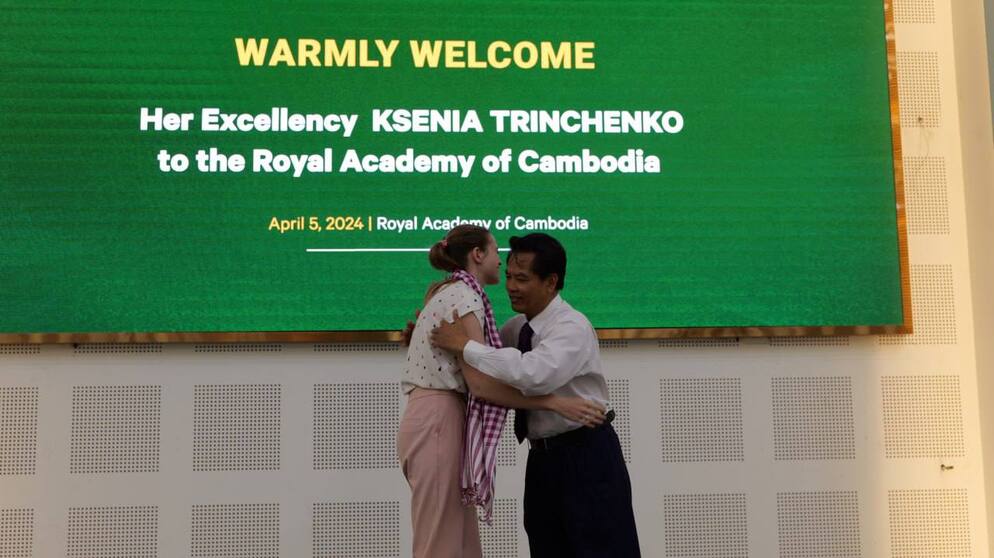
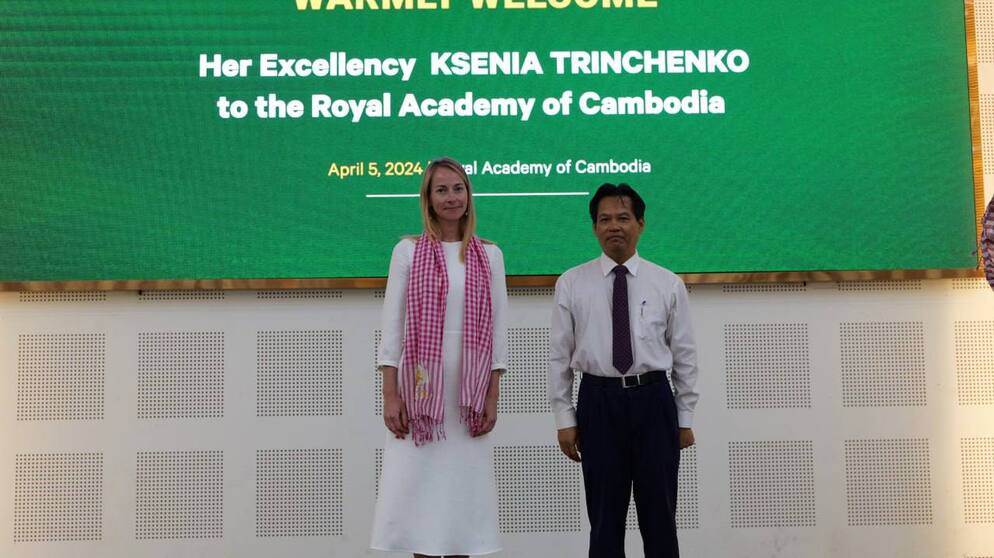
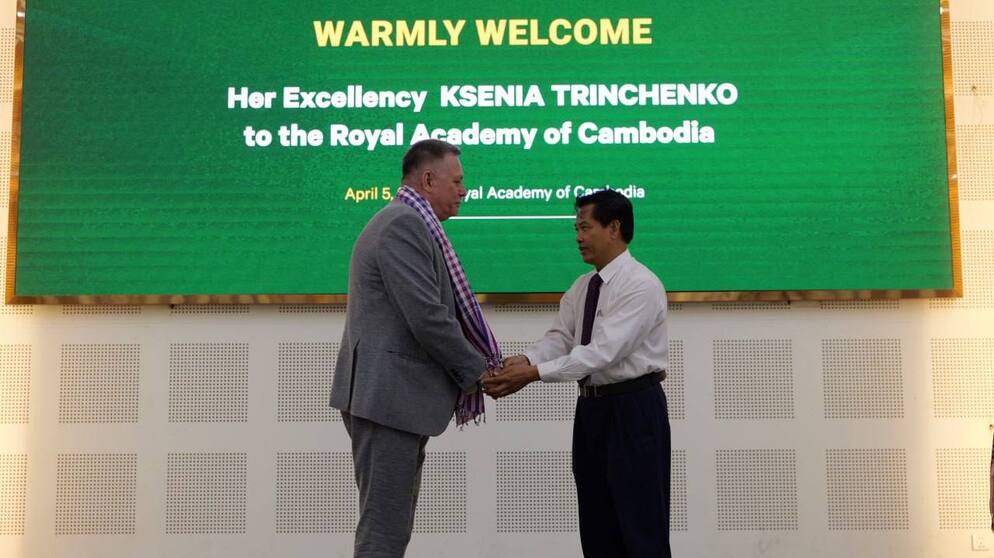
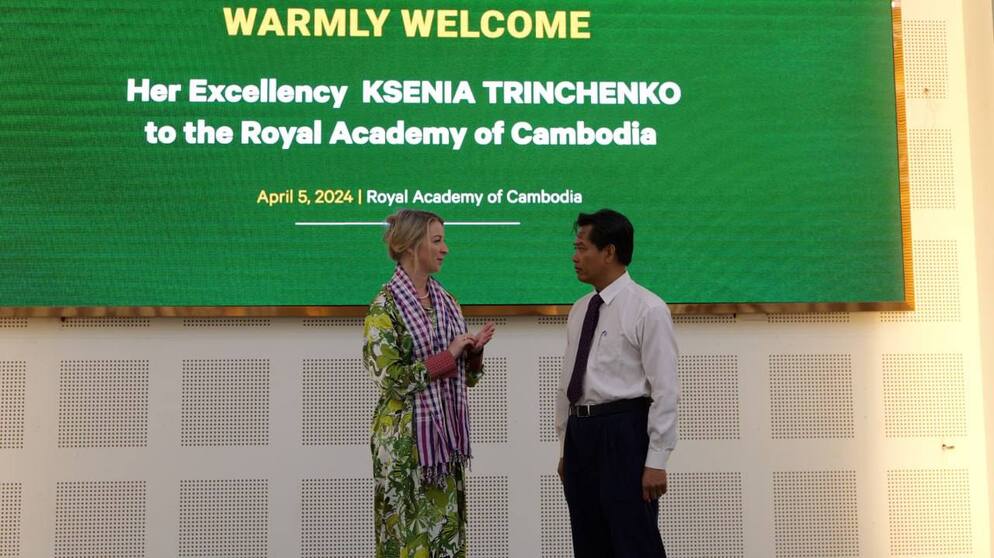
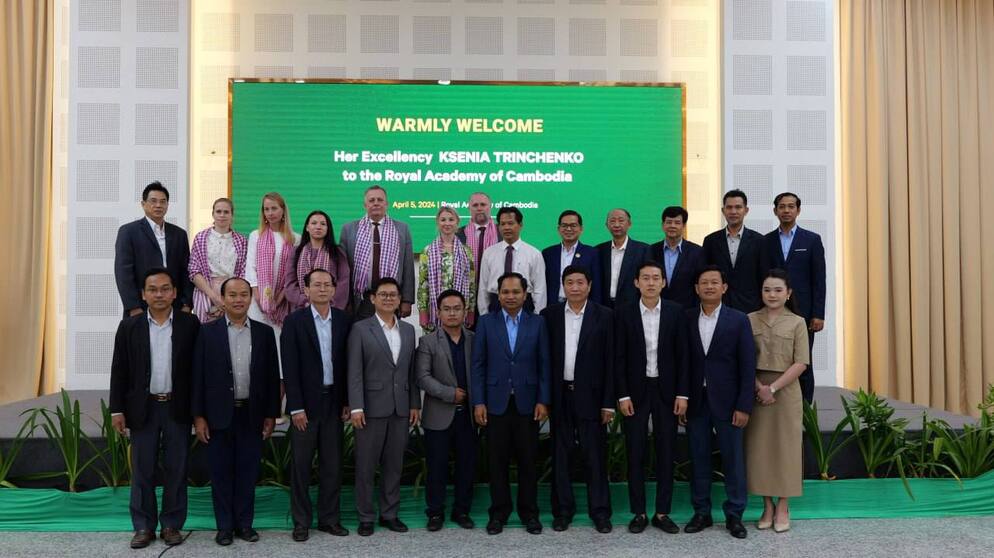
RAC Media | នាយកដ្ឋានទំនាក់ទំនងសាធារណៈ និងពិធីការ
 ថ្ងៃសុក្រ, 05 មេសា 2024 ម៉ោង 05:04 PM
ថ្ងៃសុក្រ, 05 មេសា 2024 ម៉ោង 05:04 PM
(រាជបណ្ឌិត្យសភាកម្ពុជា)៖ នៅថ្ងៃព្រហស្បតិ៍ ១១ រោច ខែផល្គុន បញ្ចស័ក ព.ស. ២៥៦៧ ត្រូវនឹងថ្ងៃទី៤ ខែមេសា ឆ្នាំ២០២៤នេះ រាជបណ្ឌិត្យសភាកម្ពុជាបានរៀបចំកម្មវិធីអបអរសាទរពិធីបុណ្យចូលឆ្នាំថ្មី ប្រពៃណីខ្មែរ ឆ្នាំរោង ឆស័ក ព.ស. ២៥៦៧ ដែលមានការចូលរួមពីសំណាក់ថ្នាក់ដឹកនាំនិងមន្ត្រីរាជការទាំងអស់នៃរាជបណ្ឌិត្យសភាកម្ពុជា និស្សិតនៃរាជបណ្ឌិត្យសភាកម្ពុជា ព្រមទាំងគ្រូបង្រៀនភាសាចិនជាជនជាតិចិនជាច្រើនរូបទៀត ក្រោមអធិបតីភាពឯកឧត្ដមបណ្ឌិតសភាចារ្យ សុខ ទូច ប្រធានរាជបណ្ឌិត្យសភាកម្ពុជា និងជាអនុប្រធានប្រចាំការក្រុមប្រឹក្សាបណ្ឌិតសភាចារ្យ។
ការចូលរួមក្នុងកម្មវិធីអបអរសាទរពិធីបុណ្យចូលឆ្នាំប្រពៃណីខ្មែរពីសំណាក់គ្រូបង្រៀនភាសាចិនជាជនជាតិចិននាឱកាសនេះ បានបង្ហាញអំពីការកសាងទំនាក់ទំនងល្អ និងការបង្កើនភាពជិតស្និទ្ធបន្ថែមទៀតរវាងប្រជាជននៃប្រទេសទាំងពីរ កម្ពុជា-ចិន ស្របពេលថ្នាក់ដឹកនាំប្រទេសជាមិត្តទាំងពីរ បានសម្រេចកំណត់យកឆ្នាំ២០២៤នេះ គឺជាឆ្នាំនៃការផ្លាស់ប្ដូរប្រជាជននិងប្រជាជន ដោយជំរុញការយល់ដឹង និងស្វែងយល់ពីគ្នាបន្ថែមទាំងនៅក្នុងទិដ្ឋភាពសង្គម វប្បធម៌ ប្រពៃណីជាដើម។
បន្ថែមពីនេះ នៅពេលរសៀល ថ្នាក់ដឹកនាំ មន្ត្រីរាជការ និងបុគ្គលិកនៃរាជបណ្ឌិត្យសភាកម្ពុជា ព្រមទាំងគ្រូបង្រៀនជនជាតិចិនទាំងអស់ ក៏នឹងចូលរួមទស្សនាការសម្ដែងសិល្បៈនៅសាលមហោស្រពខេមរវិទូ ដែលមានដូចជា ការបង្ហាញអមពីការពត់ដៃ ជើង និងដងខ្លួន ក្នុងរបាំខ្មែរ ការសម្ដែងរបាំបុប្ផាលោកីយ៍ ល្ខោននិយាយ រឿងនេះមិនមែនជាសុបិន្ត ការសម្ដែងក្បាច់គុនចិន ការសម្ដែងរបាំបុកលក្ខណ៍ របាំ+ឧបករណ៍ភ្លេង ការច្រៀងចម្រៀងរួម និងសៀកពត់ខ្លួនផងដែរ។
សូមជម្រាបជូនផងដែរថា រាជបណ្ឌិត្យសភាកម្ពុជាតែងតែមានការរៀបចំកម្មវិធីអបអរសាទរពិធីបុណ្យប្រពៃណីខ្មែរនិងចិននានា ដើម្បីជំរុញភាពជិតស្និទ្ធរវាងថ្នាក់ដឹកនាំ មន្ត្រីរាជការ និងបុគ្គលិក ក៏ដូចជាគ្រូបង្រៀនជនជាតិចិនទាំងអស់ ដែលកំពុងបម្រើការងារនៅក្នុងអង្គភាពឧបសម្ព័ន្ធ និងវិទ្យាស្ថានដែលចំណុះឱ្យរាជបណ្ឌិត្យសភាកម្ពុជាទាំងអស់។ ជាក់ស្ដែង នាពេលកន្លងទៅ ថ្នាក់ដឹកនាំនិងមន្ត្រីរាជការនៃរាជបណ្ឌិត្យសភាកម្ពុជា ក៏បានចូលរួមអបអរសាទរពិធីបុណ្យចូលឆ្នាំចិន នៅវិទ្យាស្ថានខុងជឺ នៃរាជបណ្ឌិត្យសភាកម្ពុជាផងដែរ ដើម្បីបង្កើនភាពជិតស្និទ្ធ និងផ្ដល់ភាពកក់ក្ដៅដល់គ្រូបង្រៀនជនជាតិចិន ដែលបានបំពេញបេសកកម្មបង្រៀនភាសាចិននៅក្នុងប្រទេសកម្ពុជា ក៏ដូចជានៅក្នុងរាជបណ្ឌិត្យសភាកម្ពុជាផ្ទាល់។
គួរបញ្ជាក់ផងដែរថា កាលពីថ្ងៃទី១២ ខែតុលា ឆ្នាំ២០២៣កន្លងទៅនេះ ថ្នាក់ដឹកនាំវិទ្យាស្ថានខុងជឺនៃរាជបណ្ឌិត្យសភាកម្ពុជា ក៏បានដឹកនាំគ្រូបង្រៀនជនជាតិចិនស្វែងយល់ពីពិធីបុណ្យភ្ជុំបិណ្ឌ នៅវត្តមង្គលមានលក្ខណ៍ និងវត្តពុទ្ធគីរី ដែលស្ថិតនៅក្នុងខេត្តតាកែវផងដែរ។ បន្ថែមពីនោះ រាជបណ្ឌិត្យសភាកម្ពុជា ក៏បានរៀបចំកម្មវិធីចែករំលែកពីប្រវត្តិ និងទំនៀមទម្លាប់ពិធីបុណ្យភ្ជុំបិណ្ឌជូនគ្រូបង្រៀនជនជាតិចិន ក្នុងគោលបំណងពង្រីកការយល់ដឹងបន្ថែមអំពីទំនៀមទម្លាប់និងប្រពៃណីរបស់ខ្មែរផងដែរ៕
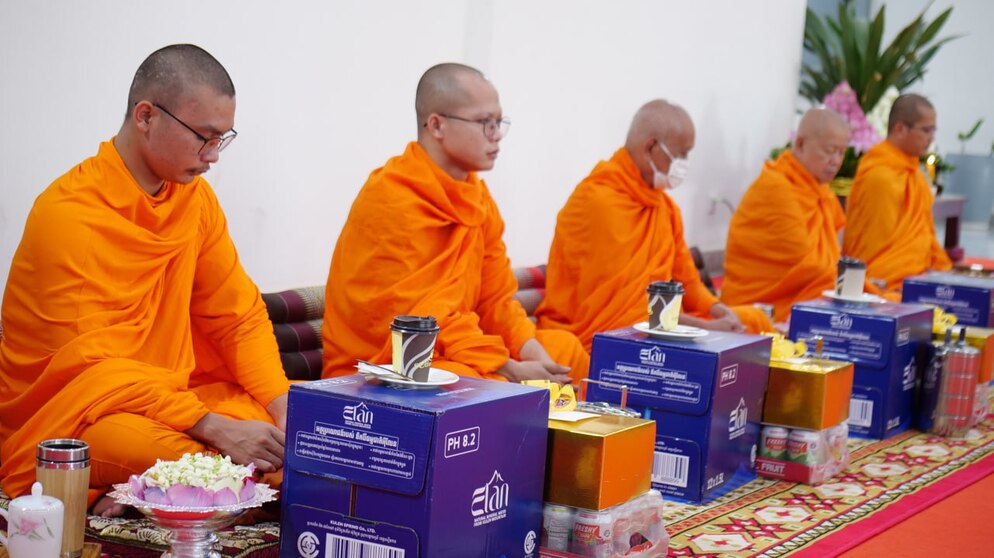
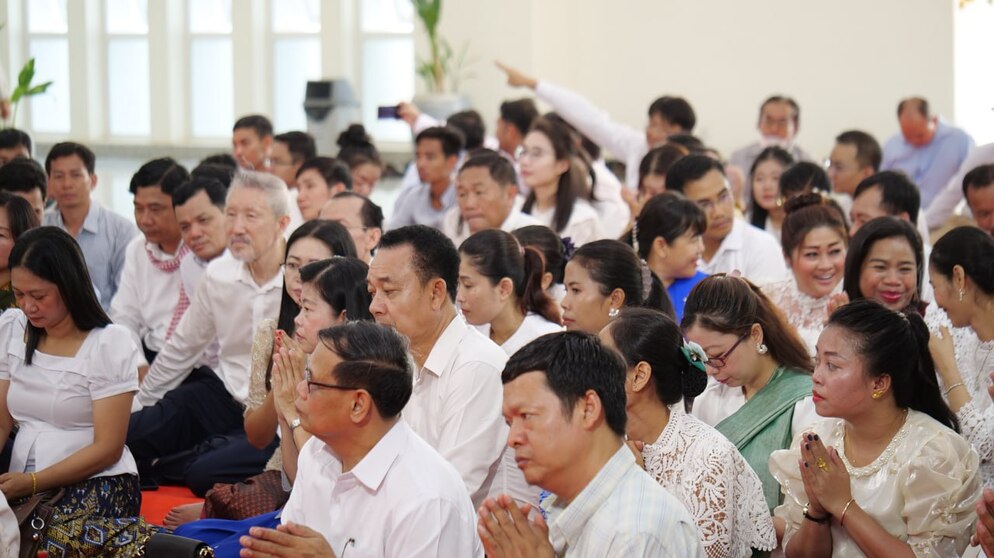
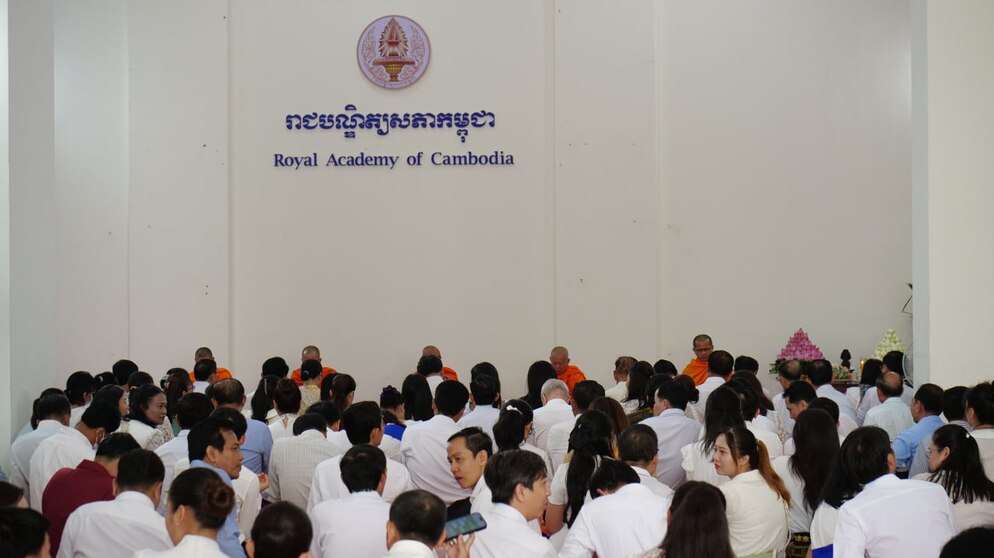
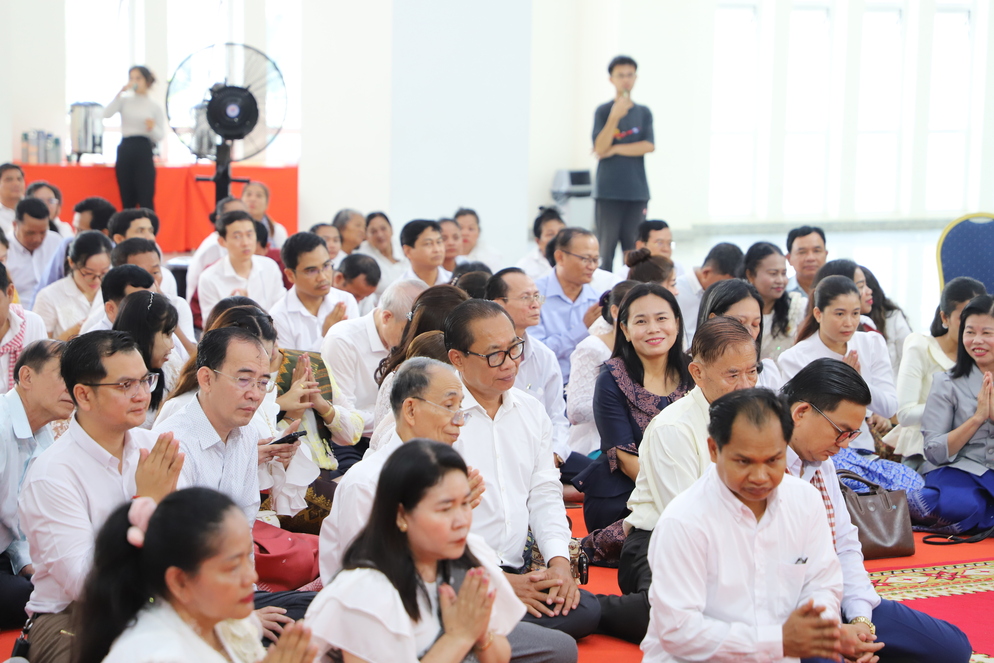
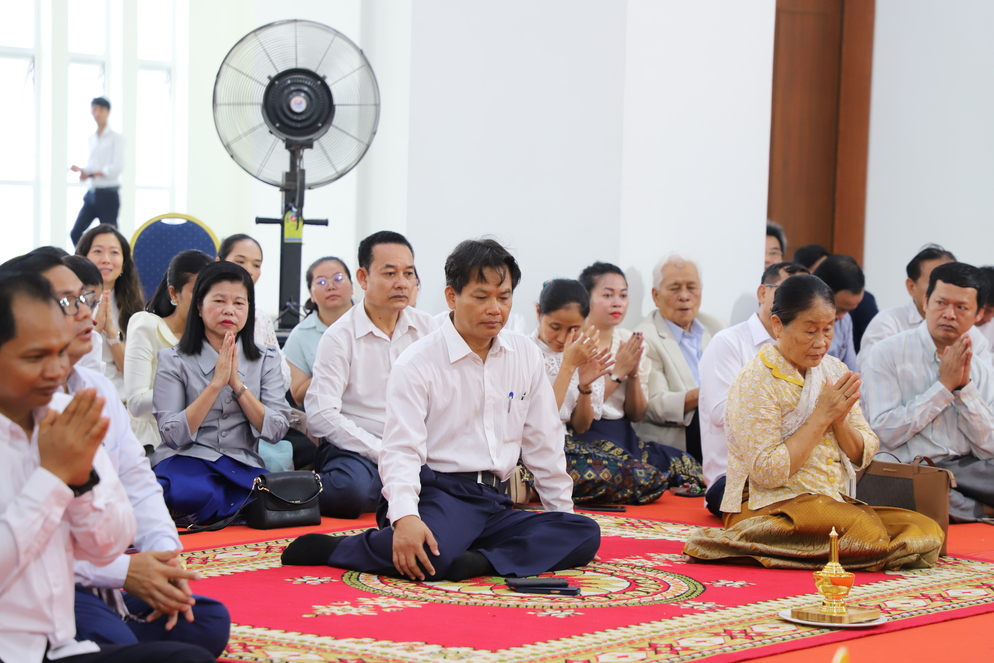
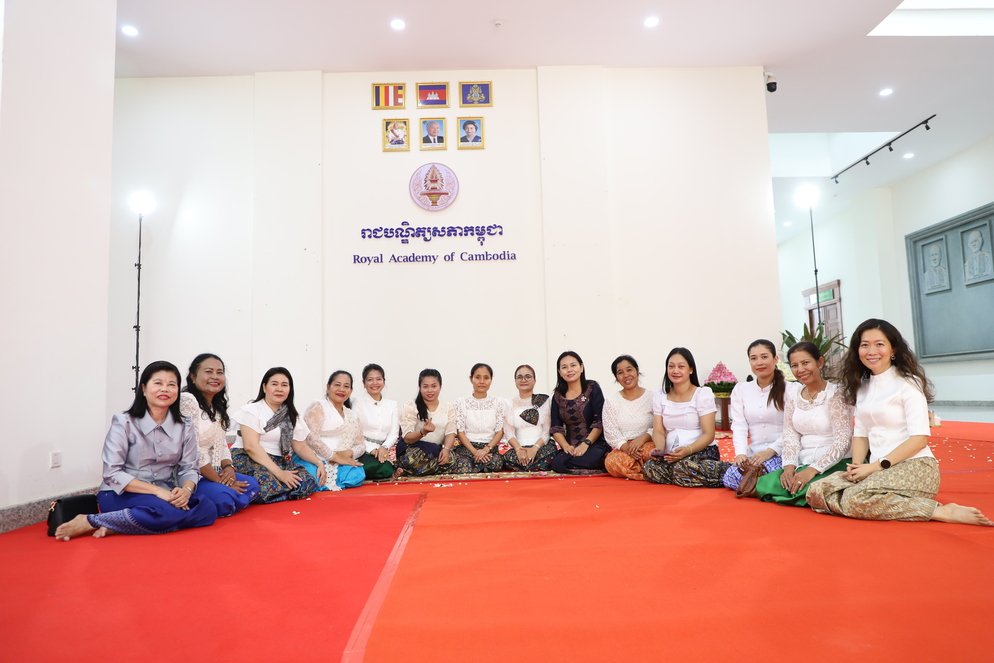
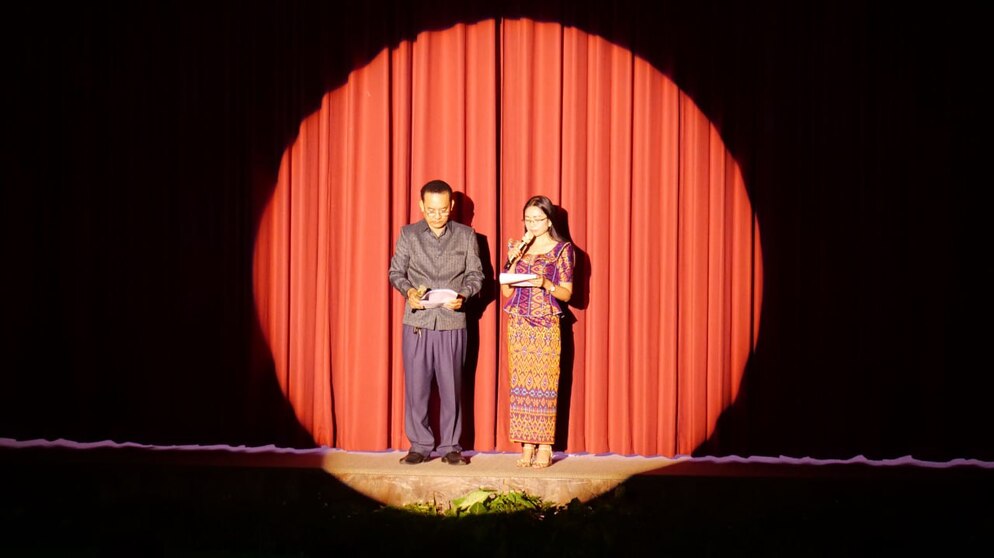
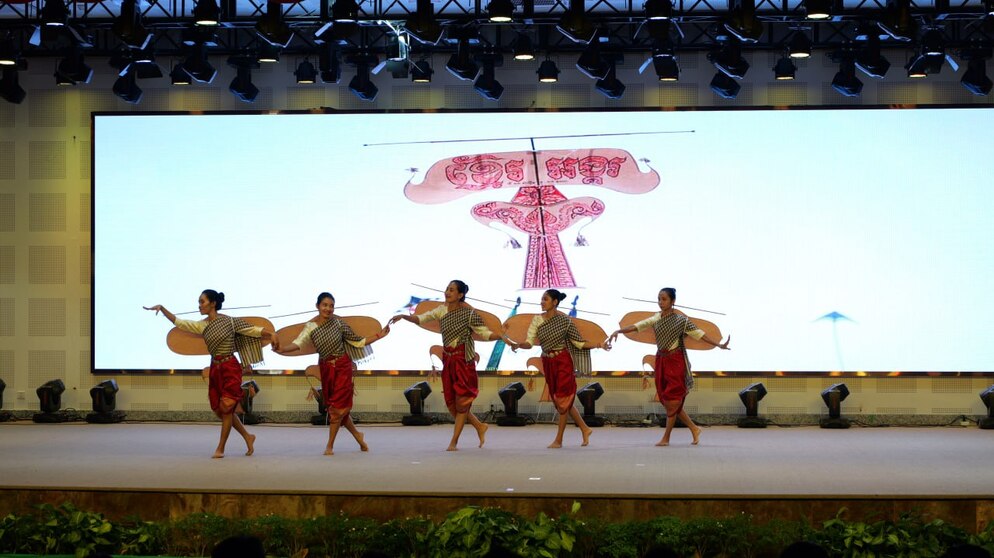
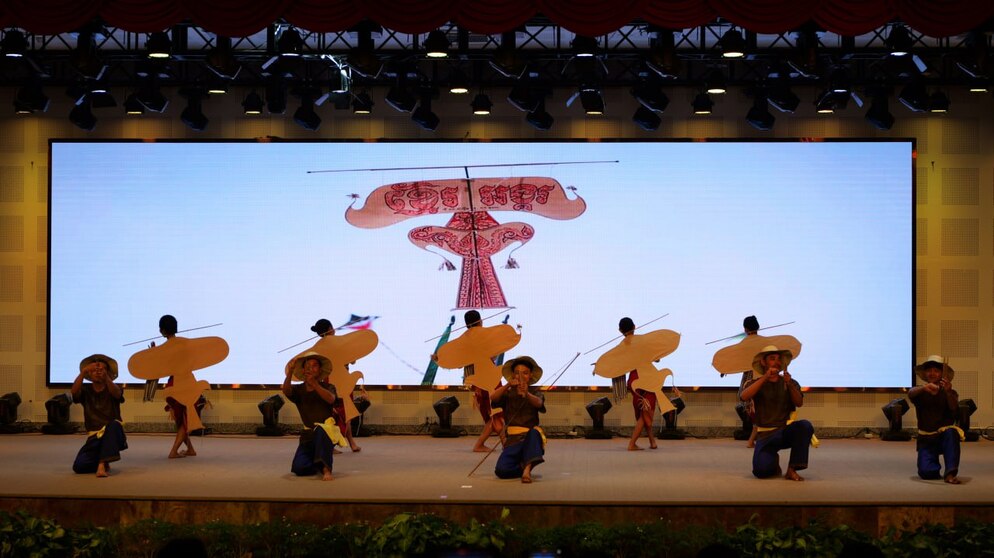
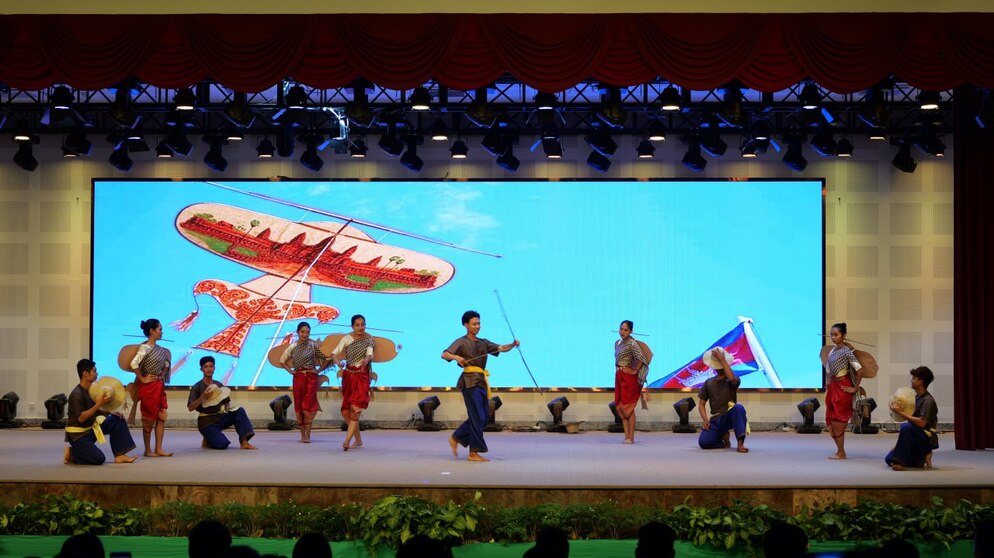
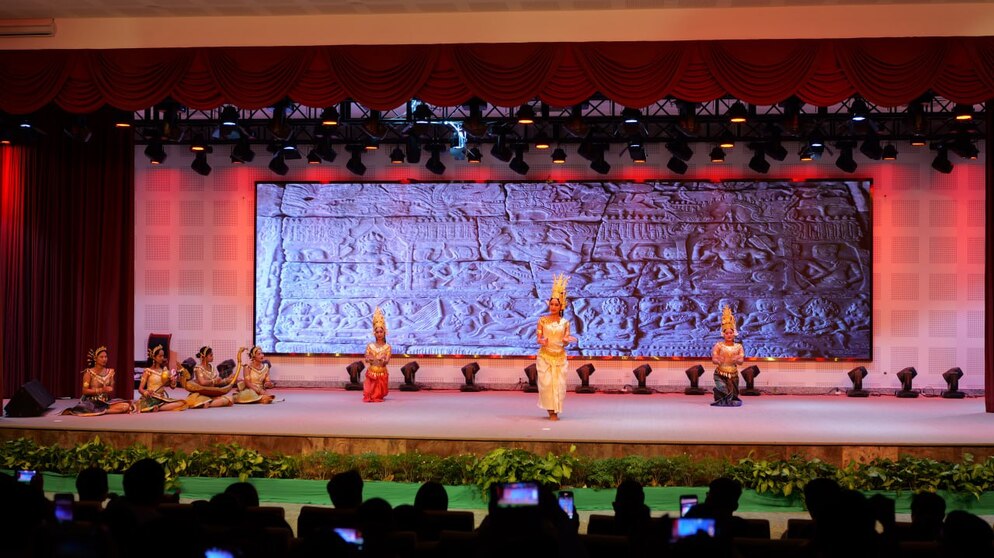
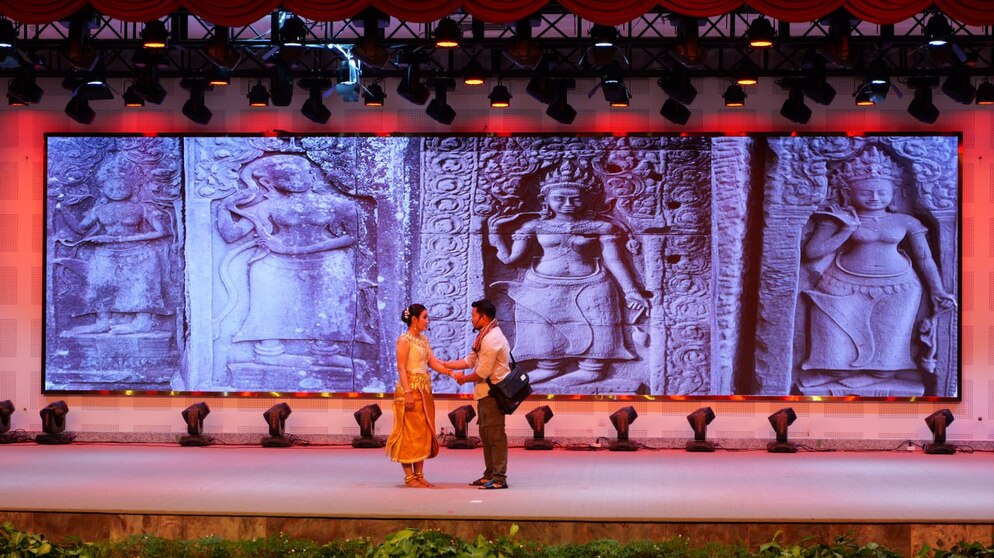
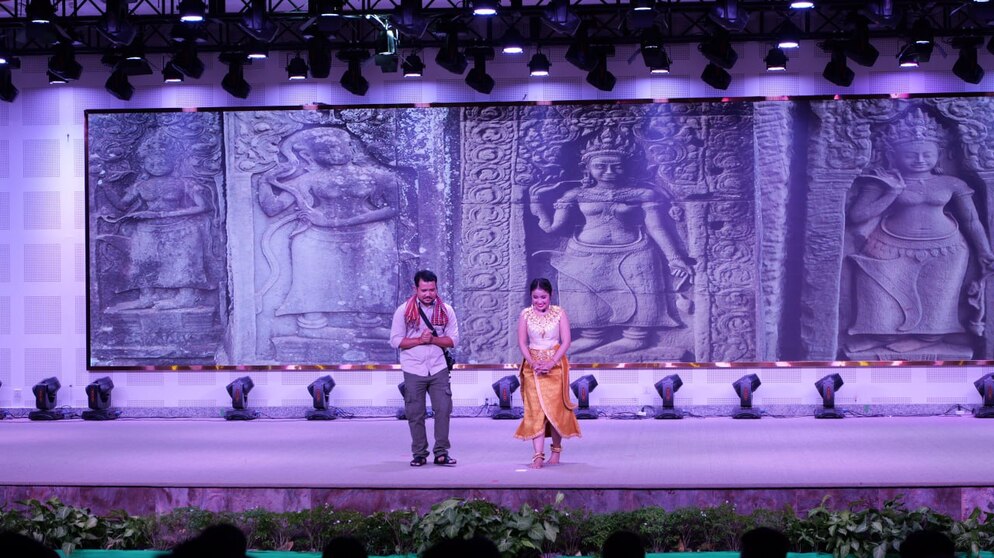
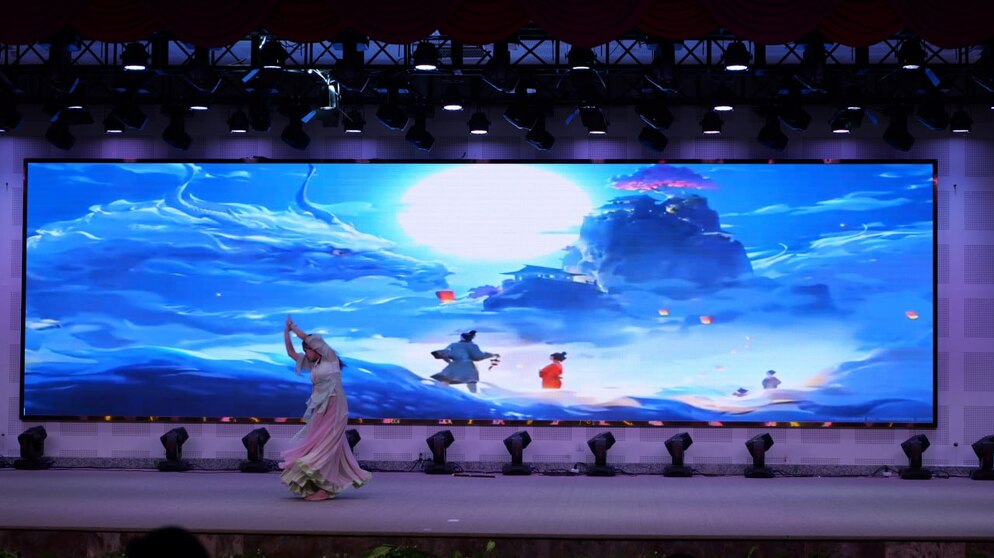
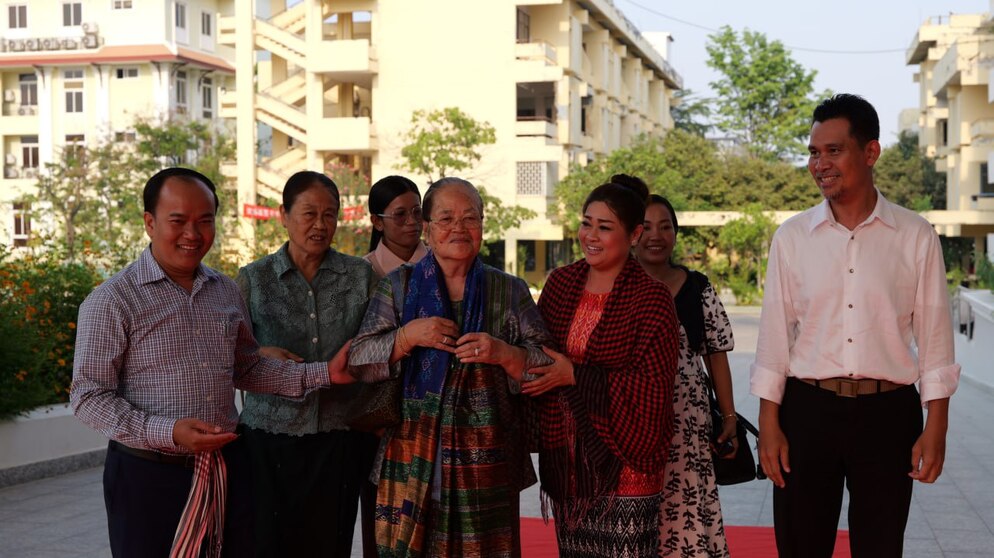
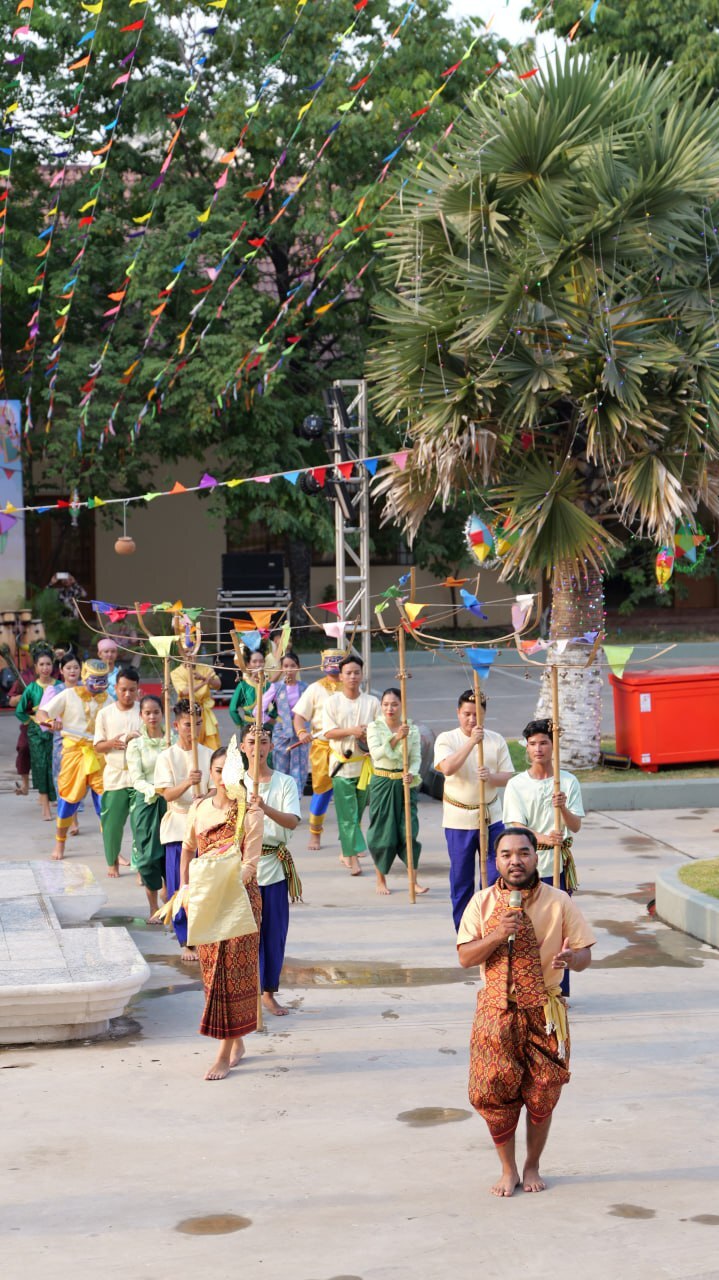
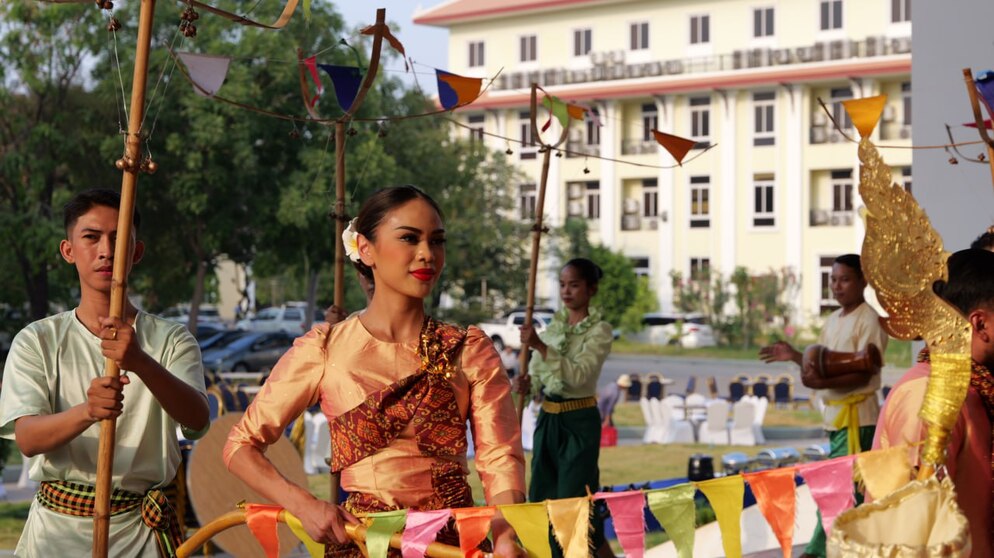
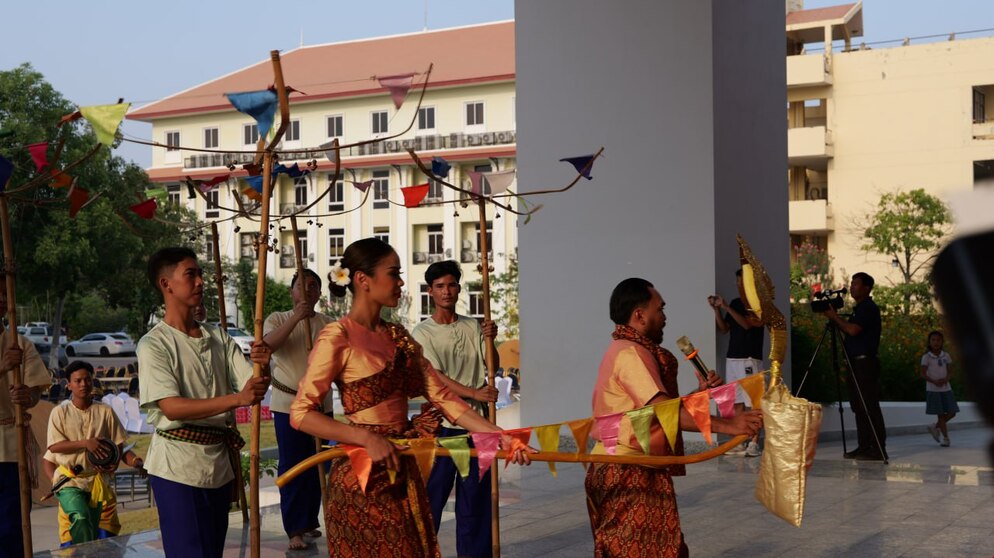
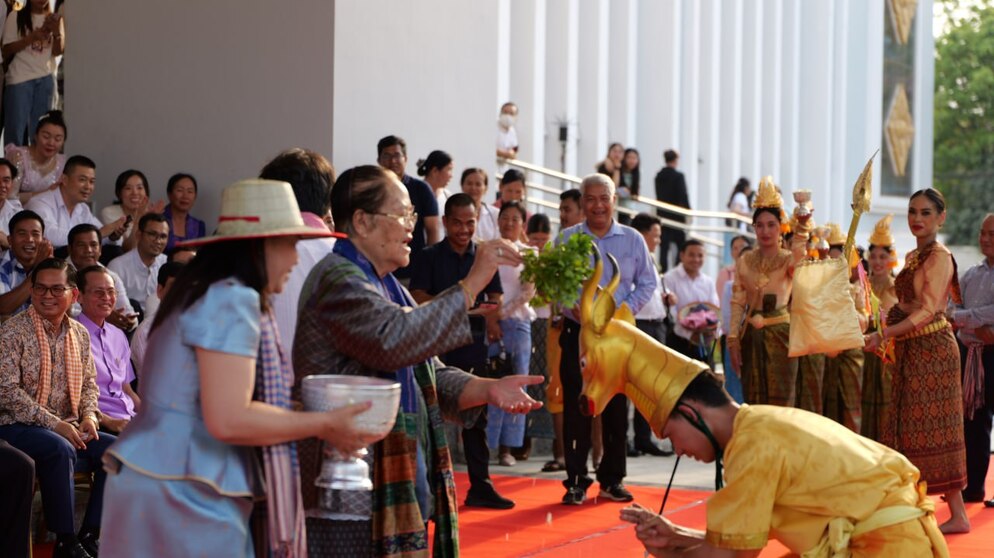
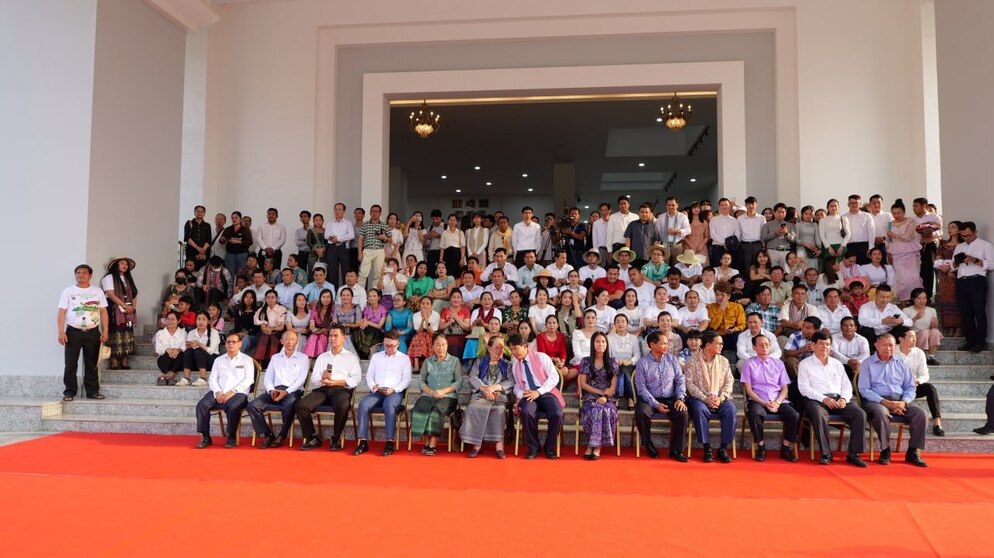
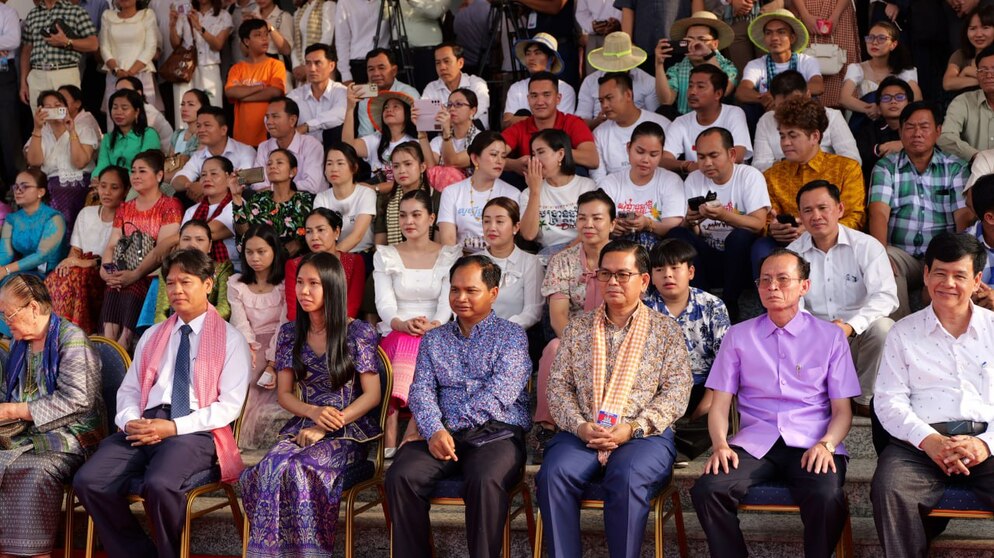
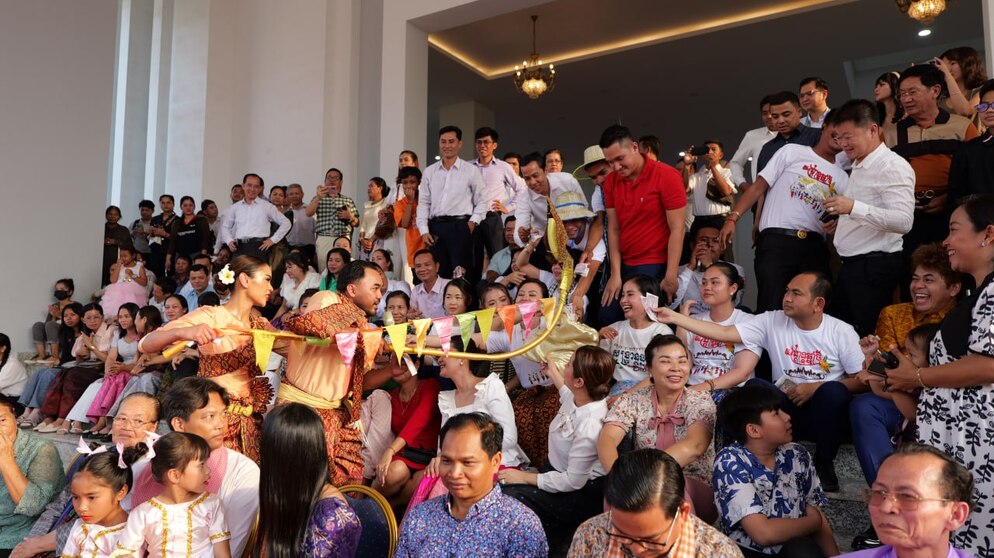
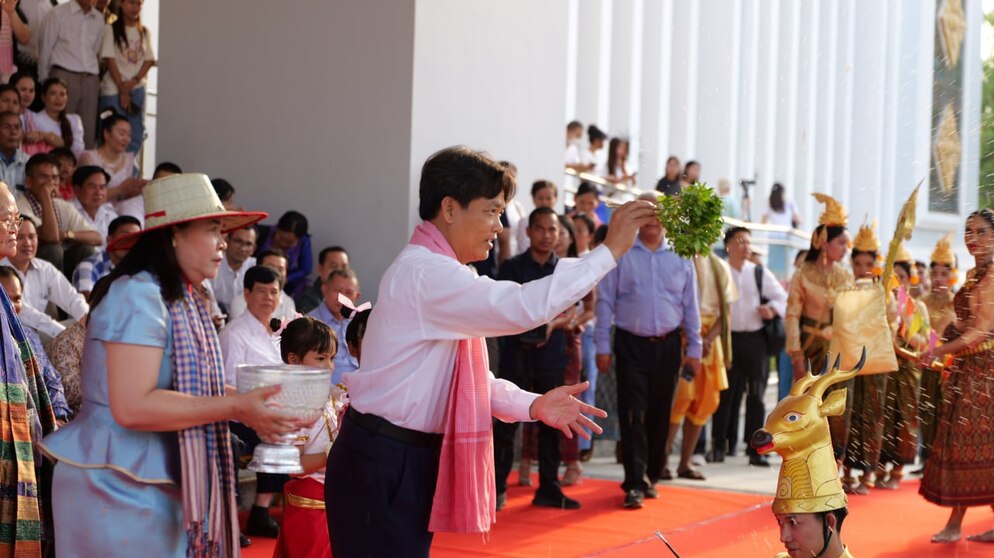
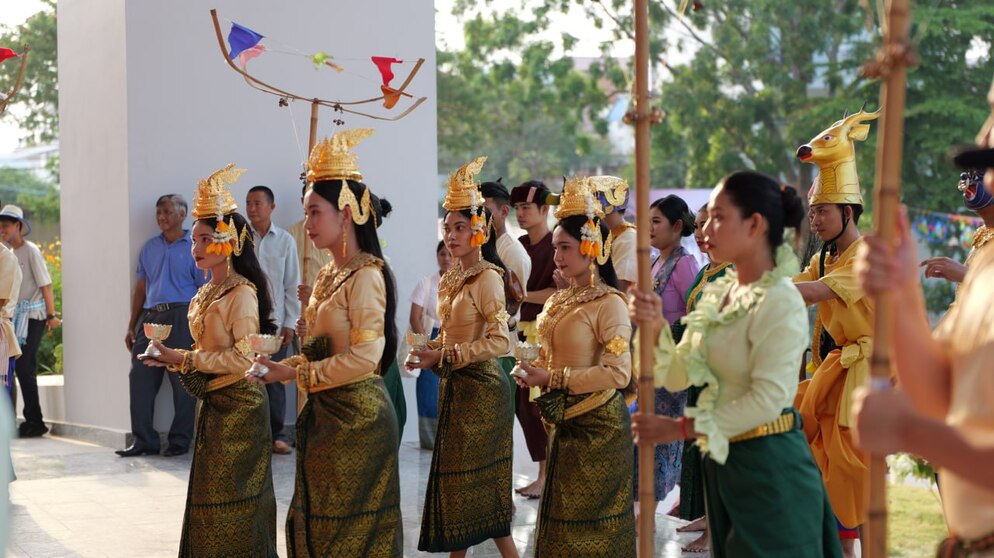
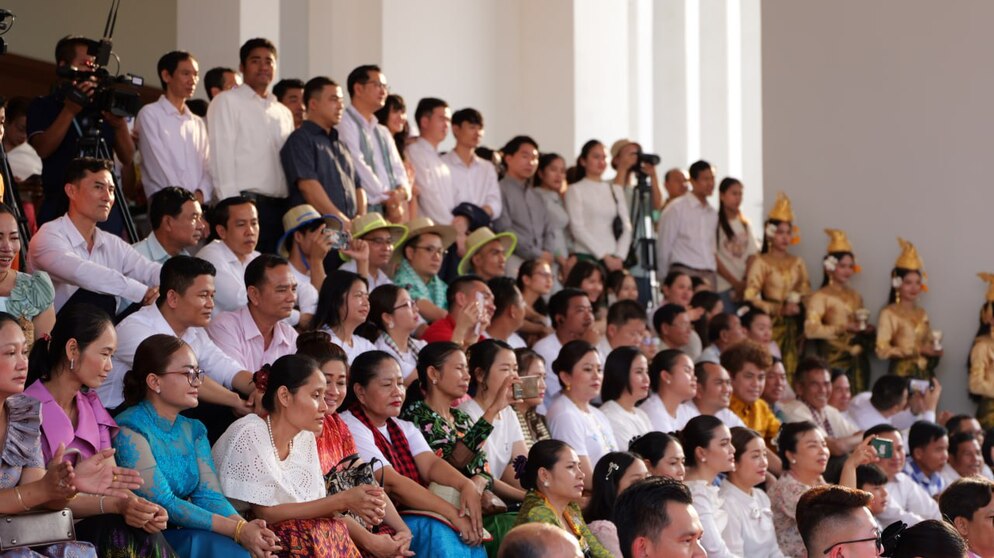
RAC Media | នាយកដ្ឋានទំនាក់ទំនងសាធារណៈ និងពិធីការ
 ថ្ងៃព្រហស្បតិ៍, 04 មេសា 2024 ម៉ោង 10:09 PM
ថ្ងៃព្រហស្បតិ៍, 04 មេសា 2024 ម៉ោង 10:09 PM
(រាជបណ្ឌិត្យសភាកម្ពុជា)៖ នៅថ្ងៃព្រហស្បតិ៍ ១១ រោច ខែផល្គុន បញ្ចស័ក ព.ស. ២៥៦៧ ត្រូវនឹងថ្ងៃទី៤ ខែមេសា ឆ្នាំ២០២៤នេះ រាជបណ្ឌិត្យសភាកម្ពុជាបានរៀបចំកម្មវិធីអបអរសាទរពិធីបុណ្យចូលឆ្នាំថ្មី ប្រពៃណីខ្មែរ ឆ្នាំរោង ឆស័ក ព.ស. ២៥៦៧ ដែលមានការចូលរួមពីសំណាក់ថ្នាក់ដឹកនាំនិងមន្ត្រីរាជការទាំងអស់នៃរាជបណ្ឌិត្យសភាកម្ពុជា ព្រមទាំងនិស្សិតនៃរាជបណ្ឌិត្យសភាកម្ពុជាជាច្រើនរូបទៀត ក្រោមអធិបតីភាពឯកឧត្ដមបណ្ឌិតសភាចារ្យ សុខ ទូច ប្រធានរាជបណ្ឌិត្យសភាកម្ពុជា និងជាអនុប្រធានប្រចាំការក្រុមប្រឹក្សាបណ្ឌិតសភាចារ្យ។
កម្មវិធីអបអរសាទរពិធីបុណ្យចូលឆ្នាំថ្មី ប្រពៃណីខ្មែរ ឆ្នាំរោង ឆស័ក ព.ស. ២៥៦៧ នាឱកាសនេះត្រូវបានរៀបចំឡើងដោយពេលព្រឹក មានការនិមន្តព្រះសង្ឃសូធ្យមន្តចម្រើនព្រះបរិត្ត លើករាសីតាមប្រពៃណីពុទ្ធសាសនា ដើម្បីទទួលបានសិរីសួស្ដីក្នុងឱកាសពិធីបុណ្យចូលឆ្នាំថ្មីប្រពៃណីខ្មែរខាងលើមុខនេះ។
បន្ថែមពីនេះ នៅពេលរសៀល ក៏មានការសម្ដែងសិល្បៈនៅសាលមហោស្រពខេមរវិទូ ដែលមានដូចជា ការបង្ហាញអមពីការពត់ដៃ ជើង និងដងខ្លួន ក្នុងរបាំខ្មែរ ការសម្ដែងរបាំបុប្ផាលោកីយ៍ ល្ខោននិយាយ រឿងនេះមិនមែនជាសុបិន្ត ការសម្ដែងក្បាច់គុនចិន ការសម្ដែងរបាំបុកលក្ខណ៍ របាំ+ឧបករណ៍ភ្លេង ការច្រៀងចម្រៀងរួម និងសៀកពត់ខ្លួនផងដែរ។
លើសពីនេះទៅទៀត ដើម្បីបង្កើនភាពសប្បាយរីករាយ និងចូលរួមចំណែកថែរក្សាវប្បធម៌ និងប្រពៃណីខ្មែរ ចាប់ពីម៉ោង៣:៥០នាទីរសៀលតទៅ ក៏មានការរៀបចំលេងកម្សាន្តល្បែងប្រជាប្រិយខ្មែរមួយចំនួនដូចជា ល្បែងចោលឈូង បោះអង្គុញ លាក់កន្សែង វាយក្អម ទូលក្អម និងរុញអង្រែផងដែរ។ ការរៀបចំលេងកម្សាន្តល្បែងប្រជាប្រិយខ្មែរនេះ គឺជាសារមួយដើម្បីបង្ហាញអំពីភាពចម្រុះនៃមរតកវប្បធម៌ខ្មែរទៅកាន់មហាជន ពិសេសយុវជនជំនាន់ក្រោយ ក៏ដូចជាបង្កើនការចងចាំអនុស្សារីយ៍ប្រកបដោយភាពសោមនស្សរីករាយក្នុងឱកាសអបអរសាទរពិធីបុណ្យចូលឆ្នាំប្រពៃណីខ្មែរផ្សារភ្ជាប់នឹងការថែរក្សាអត្តសញ្ញាណនៃការប្រារព្ធពិធីបុណ្យប្រពៃណីជាតិផងដែរ៕
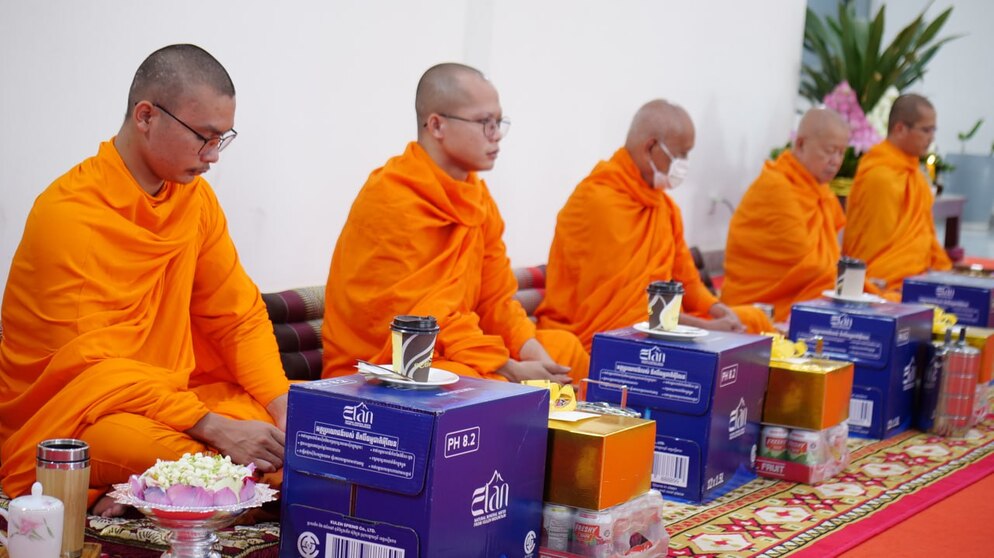
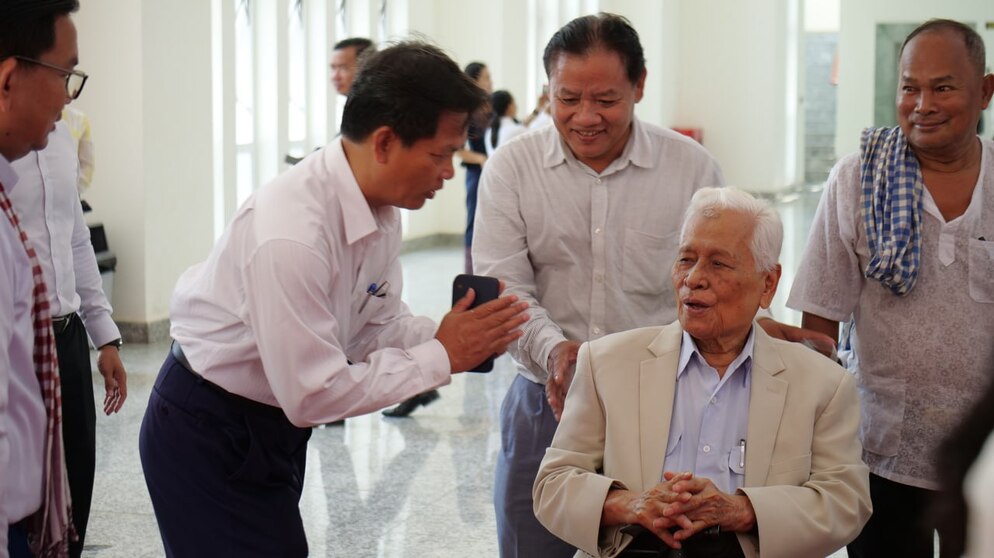
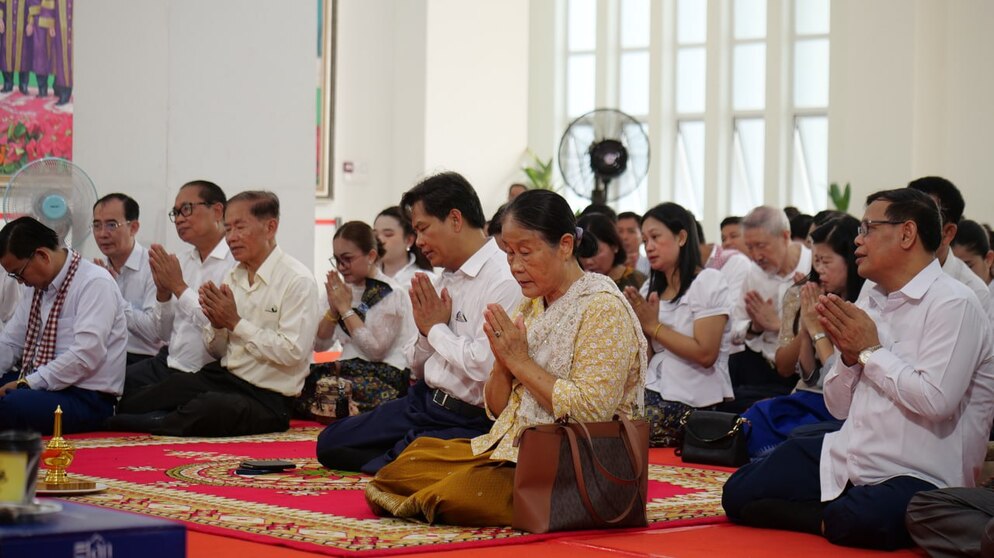
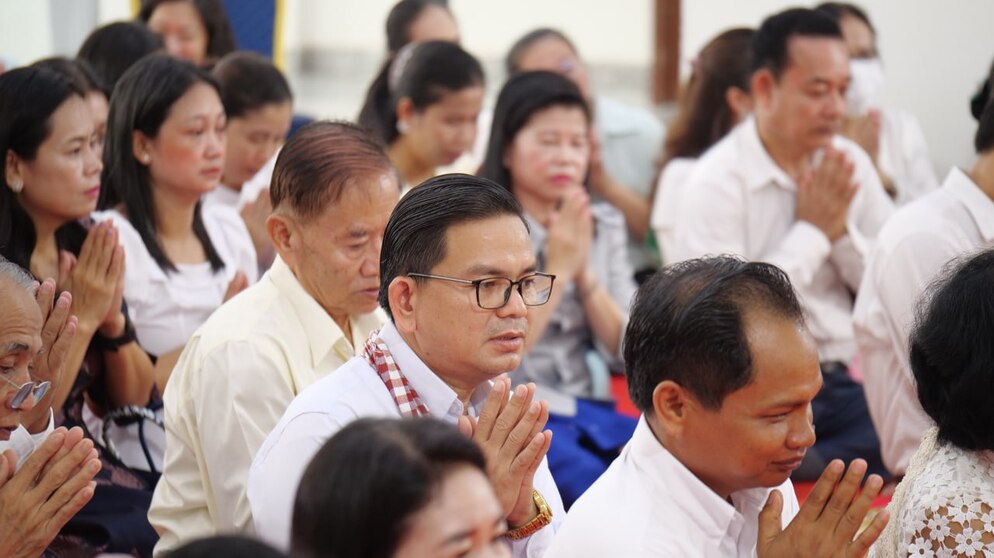
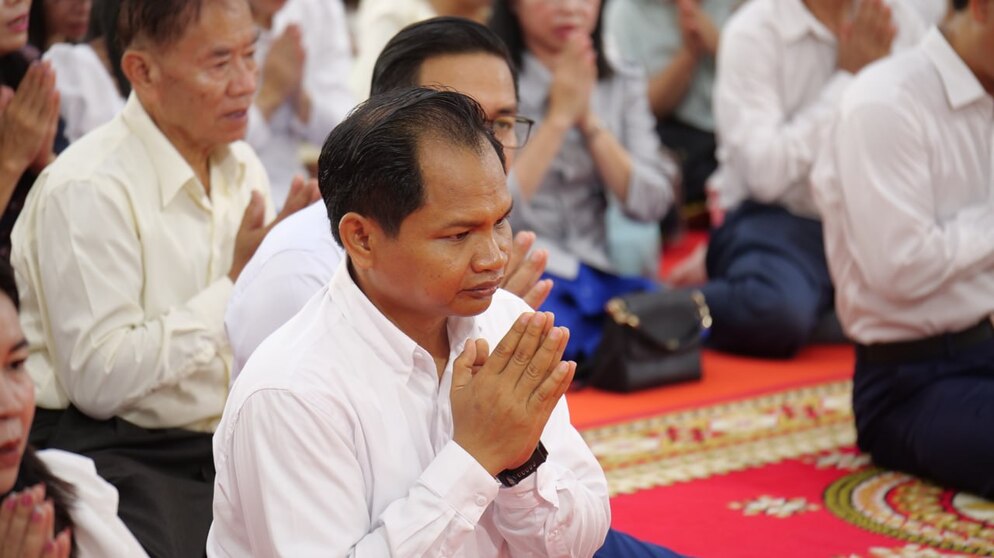
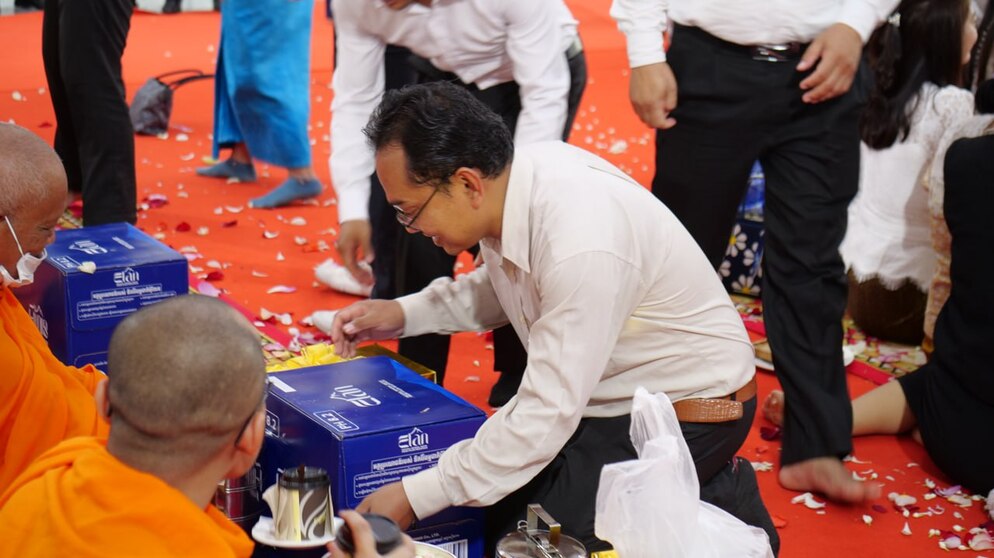
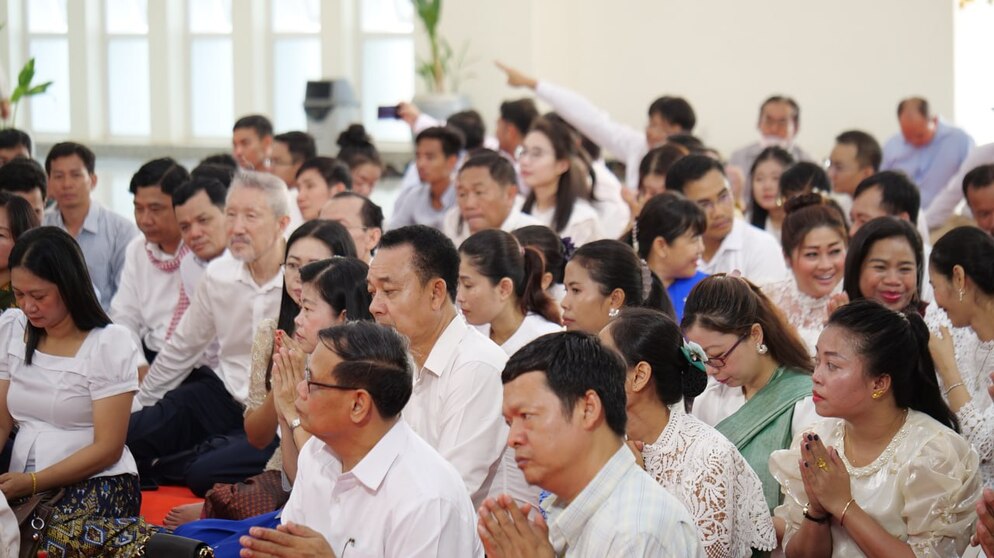
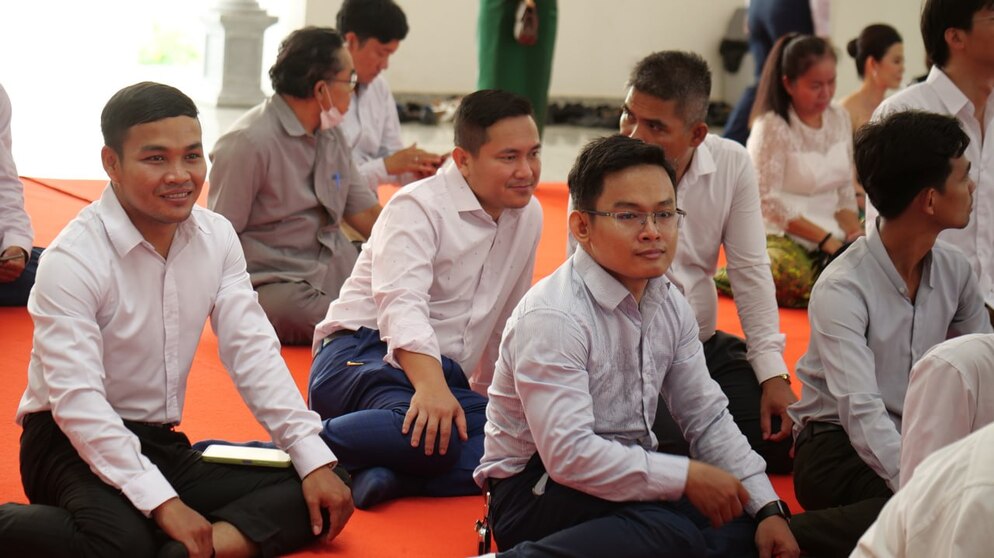
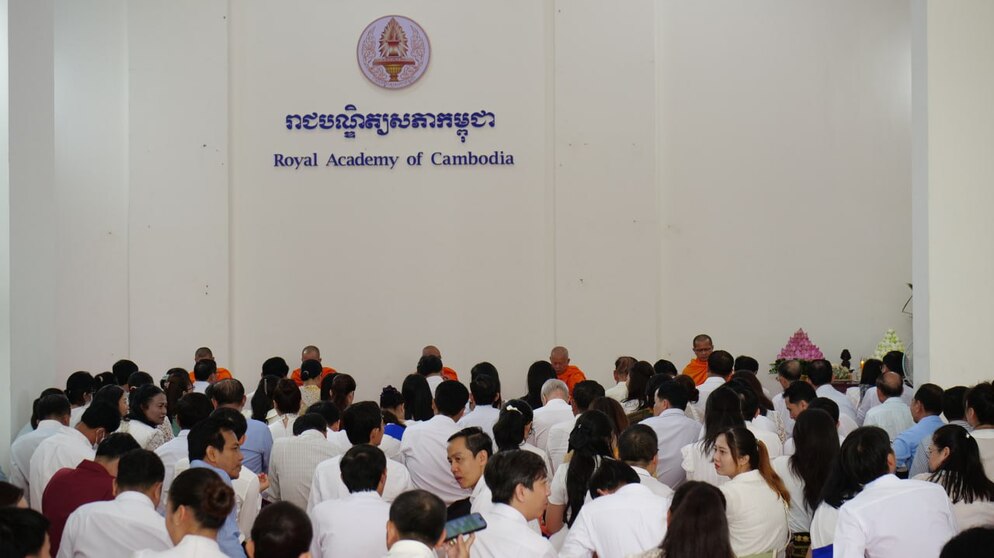
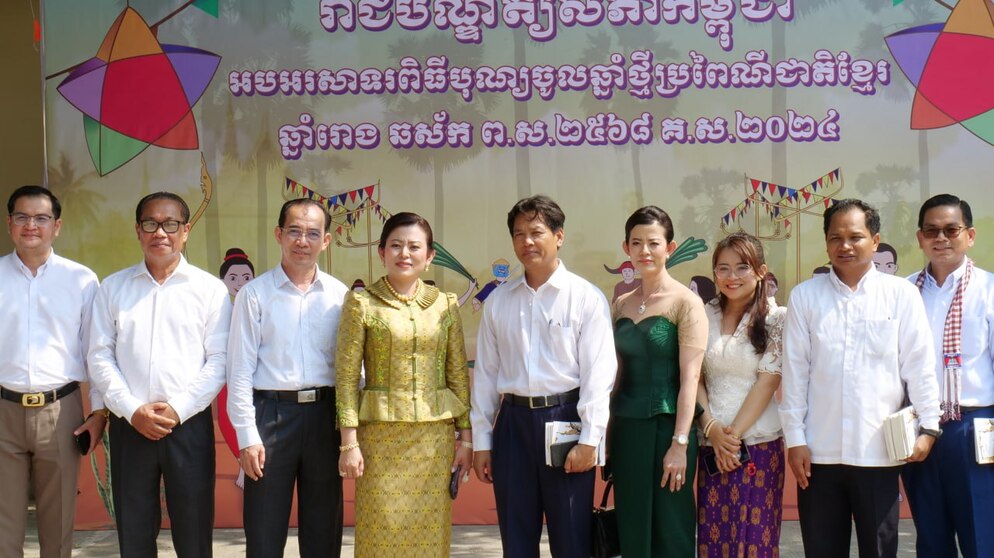
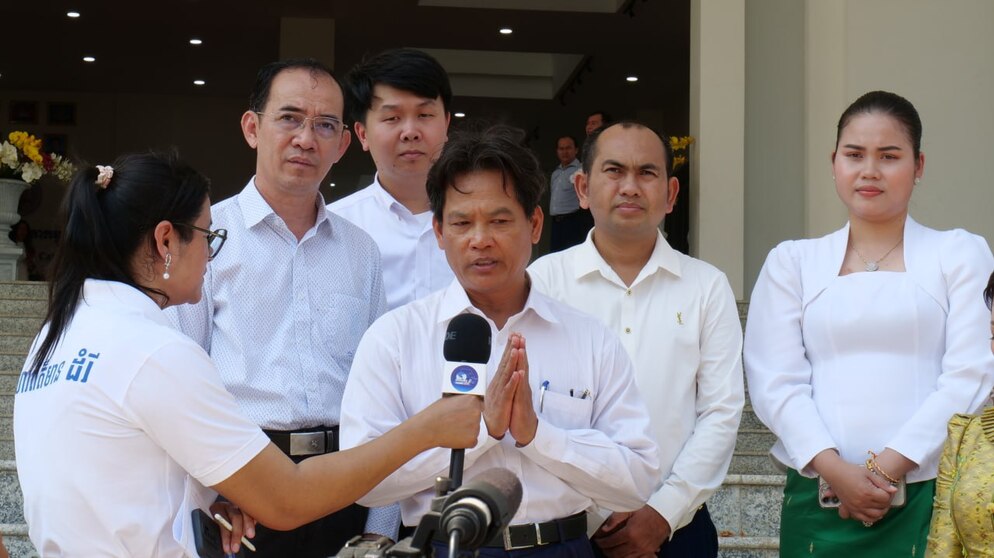
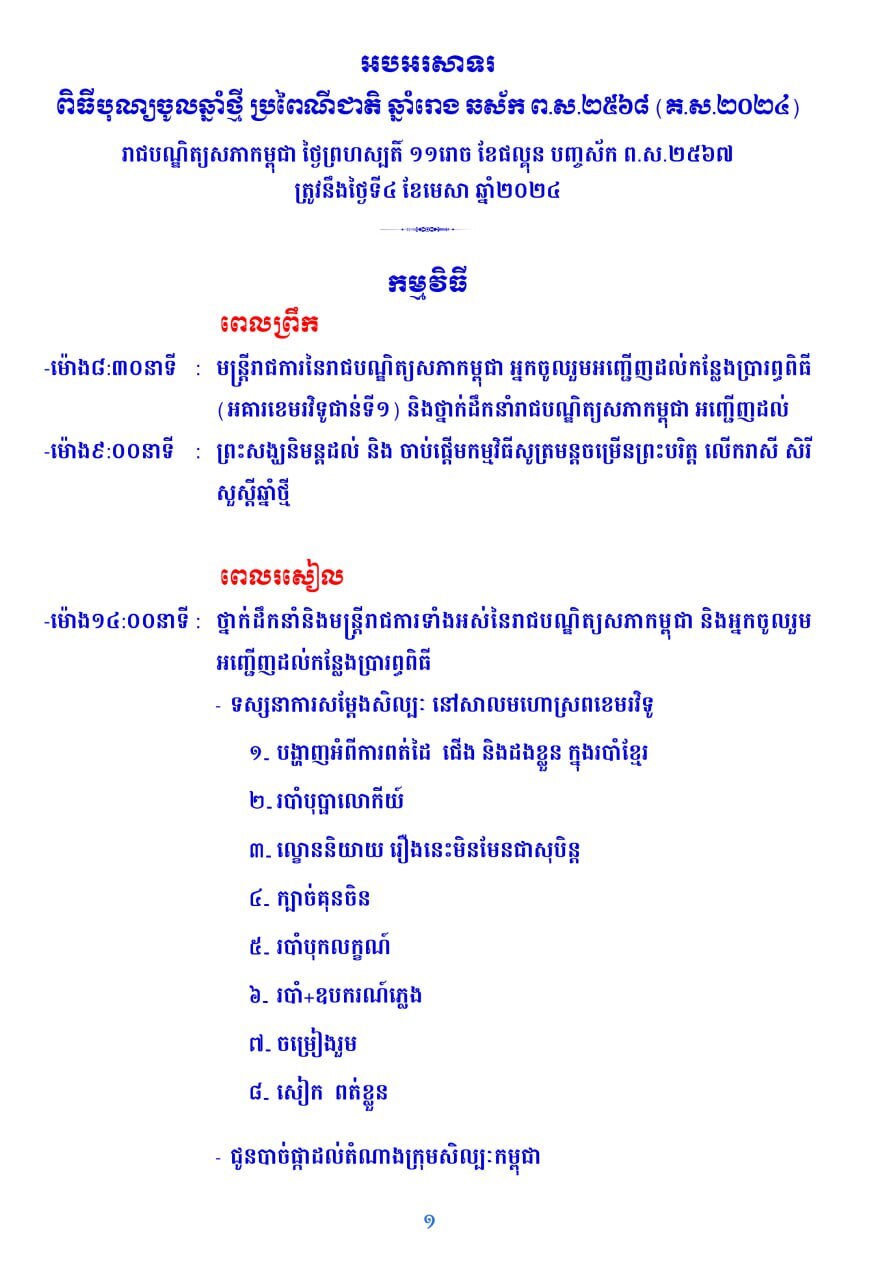
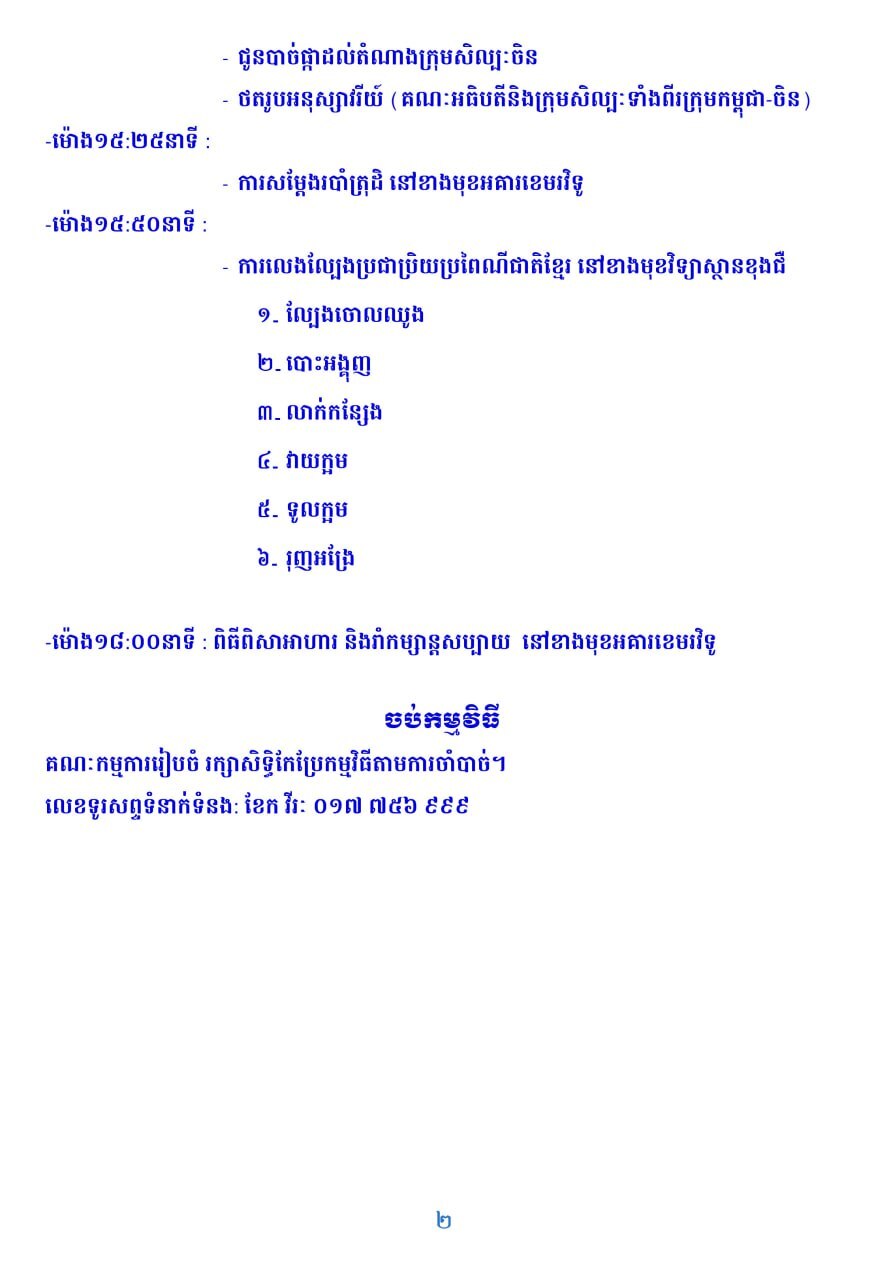
RAC Media | នាយកដ្ឋានទំនាក់ទំនងសាធារណៈ និងពិធីការ
 ថ្ងៃព្រហស្បតិ៍, 04 មេសា 2024 ម៉ោង 11:25 AM
ថ្ងៃព្រហស្បតិ៍, 04 មេសា 2024 ម៉ោង 11:25 AM
ការកំណត់ថ្ងៃខែចូលឆ្នាំថ្មីប្រពៃណីជាតិខ្មែរយើងតាំងពីយូលង់ណាស់មកហើយនោះគឺកំណត់យកតាមចន្ទគតិគឺកំណត់យកខែមិគសិរជាដើមឆ្នាំ។តាមចន្ទគតិគេកំណត់បែកចែកជា៣រដូវកាលធំៗនោះគឺៈ
១.ហេមន្តរដូវ ចាប់គិតពីថ្ងៃ១រោចខែកត្តិកដល់ថ្ងៃពេញបូរណ៌មីខែផល្គុន។ ហេមន្តរដូវនេះ ជារដូវត្រជាក់ ត្រូវចាត់ទុកជាដើមឆ្នាំលោកប្រៀបថាជាពេលវេលាពេលព្រឹក។
២. គិម្ហរដូវ ចាប់គិតពីថ្ងៃ១រោចខែផល្គុនដល់ថ្ងៃពេញបូរណ៌មីខែអាសាធ។ គិម្ហរដូវជារដូវក្តៅខ្លាំងចាត់ទុកជាកណ្តាលឆ្នាំលោកប្រៀបថាជាពេលវេលាពេលថ្ងៃត្រង់។
៣. វស្សានរដូវចាប់គិតពីថ្ងៃ១រោចខែអាសាធដល់ថ្ងៃពេញបូរណ៌មីខែកត្តិក។ វស្សានរដូវជារដូវមេឃមីស្រទុំងងឹតនិងមានភ្លៀងផ្គរលោកចាត់ទុកថាជាចុងឆ្នាំប្រៀបថាជាពេលវេលាពេលល្ងាច។
បុរាណាចារ្យកំណត់យកខែមិគសិរជាខែទីមួយនៅក្នុងចន្ទគតិ ខែបុស្សជាខែទី២ រៀងទៅដល់ខែកត្តិកជាខែទី១២។
ចន្ទគតិ ដំណើរនៃព្រះចន្ទនោះកំណត់តាមក្បួនហោរមួយជុំពិភពម្តងគឺ ក្នុងរវាង២៩ថ្ងៃជាងកន្លះរាប់ជាមួយខែ និង១២ខែរាប់ជាមួយឆ្នាំ តែបើមានលើកអធិមាស គឺ១៣ខែជាមួយឆ្នាំ។ រដូវតាមចន្ទគតិនោះមិនទៀងត្រង់តាមធម្មតារហូតទៅ។ បុរាណាចារ្យគិតថា ប្រសិនបើយើងកំណត់យកប្រើតែចន្ទគតិ១យ៉ាង ច្រើនពាន់ឆ្នាំទៅខាងមុខទៀតនឹងត្រលប់ប្រែប្រួលរដូវ ដូចជារដូវរងាក្លាយជារដូវក្តៅ ហើយរដូវក្តៅក៏ក្លាយជារដូវមានភ្លៀងធ្លាក់ទៅវិញ។
សូមចូលអានខ្លឹមសារលម្អិត និងមានអត្ថបទស្រាវជ្រាវជាច្រើនទៀតតាមរយ:តំណភ្ជាប់ដូចខាងក្រោម៖
https://rac.gov.kh/researchs-categories/15/researchs?page=2
RAC Media
រូបថត កម្ពុជាថ្មី (១ ខែមេសា ឆ្នាំ២០២២)
 ថ្ងៃពុធ, 03 មេសា 2024 ម៉ោង 09:40 PM
ថ្ងៃពុធ, 03 មេសា 2024 ម៉ោង 09:40 PM
នៅព្រឹកថ្ងៃទី៣ ខែមីនា ឆ្នាំ២០២៤នេះ ព្រឹទ្ធសភានៃព្រះរាជាណាចក្រកម្ពុជាបានប្រាព្ធពិធីបើកសម័យប្រជុំដំបូង នីតិកាលទី៥ ក្រោមព្រះរាជាធិបតីភាពព្រះករុណាព្រះបាទសម្ដេចព្រះបរមនាថ នរោត្ដម សីហមុនី ព្រះមហាក្សត្រនៃព្រះរាជាណាចក្រកម្ពុជា ដែលមានការចូលរួមពីសំណាក់សមាជិកព្រឹទ្ធសភា៦២អង្គ/រូប ដែលក្នុងនោះ សមាជិកចំនួន ២អង្គ ត្រូវបានចាត់តាំងដោយព្រះមហាក្សត្រ សមាជិកចំនួន ២រូប ត្រូវបានជ្រើសតាំងដោយរដ្ឋសភា និងសមាជិកចំនួន ៥៨រូប ត្រូវបានជ្រើសតាំងដោយការបោះឆ្នោតអសកល។
ជាលទ្ធផលនៃការបោះឆ្នោតជ្រើសរើសថ្នាក់ដឹកនាំព្រឹទ្ធសភានាព្រឹកនេះ សមាជិកទាំង ៦២អង្គ/រូប បានបោះឆ្នោតគាំទ្រសម្ដេចតេជោ ហ៊ុន សែន ជាប្រធានព្រឹទ្ធសភា ឯកឧត្ដម ប្រាក់ សុខុន ជាអនុប្រធានទី១ និងឯកឧត្ដម អ៊ុច បូររិទ្ធ ជាអនុប្រធានទី២។ លទ្ធផលនេះបានសបញ្ជាក់ឱ្យឃើញថា ឥស្សរជនជាន់ខ្ពស់នយោបាយកម្ពុជាទាំង៦២ អង្គ/រូប មានការយល់ឃើញស្របគ្នា និងបានគាំទ្រយ៉ាងពេញទំហឹងចំពោះ បេក្ខភាពសម្ដេចតេជោជាប្រធានស្ថាប័នកំពូលរបស់ជាតិមួយនេះ និងបេក្ខភាពអនុប្រធានទាំងពីររូបមកពីគណបក្សប្រជាជនកម្ពុជា ដែលសុទ្ធសឹងជាឥស្សរជនពោរពេញទៅដោយបទពិសោធនិងមូលធនទស្សនៈ នៅក្នុងនយោបាយការបរទេសកម្ពុជា។
លទ្ធផលនៃការបោះឆ្នោតនាពេលនេះ មិនត្រឹមតែបានបង្ហាញអំពី ការវាយតម្លៃខ្ពស់ចំពោះតួនាទីរបស់សម្ដេចតេជោជាប្រធានគណបក្សប្រជាជន នៅក្នុងការដឹកនាំនិងពង្រឹងតួនាទីរបស់ព្រឹទ្ធសភាប៉ុណ្ណោះទេ ថែមទាំងជាសារបង្ហាញពីការយល់ឃើញដូចគ្នារបស់សមាជិកព្រឹទ្ធសភាទាំងអស់ថា ដល់ពេលវេលាដែលកម្ពុជាត្រូវពង្រឹង និងពង្រីកបន្ថែមនូវទំនាក់ទំនងនយោបាយការបរទេសរបស់ខ្លួន តាមរយៈបទពិសោធន៍និងទេពកោសល្លដ៏ប៉ិនប្រសប់របស់បុរសខ្លាំងកម្ពុជា សម្ដេចតេជោ ហ៊ុន សែន ដែលជាប្រធានស្ថាប័ននេះផងដែរ។
លើសពីនេះ ការបោះឆ្នោតគាំទ្របេក្ខភាពសម្ដេចតេជោជាប្រធានព្រឹទ្ធសភា ពីសំណាក់សមាជិកព្រឹទ្ធសភាទាំង៦២ អង្គ/រូប ក៏មានសម្លេងរបស់សមាជិកព្រឹទ្ធសភាមកពីគណបក្សជំទាស់ចំនួន ៣រូបផងដែរ ដែលប្រការនេះបានបង្ហាញការទទួលស្គាល់នូវឥទ្ធិពល និងតួនាទីនយោបាយដ៏ចាំបាច់មិនអាចខ្វះបានរបស់សម្ដេច តេជោ ហ៊ុន សែន នៅក្នុងដំណើរនយោបាយរបស់កម្ពុជា បើទោះបីជាកន្លងមក អ្នកនយោបាយជំទាស់ តែងតែបង្ហាញនិន្នាការមិនយល់ស្របនឹងការដឹកនាំរបស់គណបក្សកាន់អំណាច ឬចំពោះយុទ្ធសាស្ត្រដឹកនាំរបស់សម្ដេចតេជោក៏ដោយក្ដី ព្រោះទោះបីជាយ៉ាងណាក៏ដោយ ទាំងអ្នកនយោបាយជំទាស់ និងអ្នកគាំទ្ររបស់ពួកគេ នៅតែទទួលបាននូវផលដោយផ្ទាល់ឬប្រយោល ចេញពីការអភិវឌ្ឍសង្គម ដែលជាផ្លែផ្កាកើតឡើងពីការដាក់ចេញនូវគោលនយោបាយ និងយុទ្ធសាស្ត្រដឹកនាំរបស់សម្ដេចតេជោប្រធានគណបក្សកាន់អំណាចផងដែរ៕


RAC Media | លឹម សុវណ្ណរិទ្ធ
---
* រាល់ទស្សនៈដែលបានលើកឡើងខាងលើនេះ គឺជាទស្សនៈយល់ឃើញផ្ទាល់របស់ស្មេរ និងមិនឆ្លុះបញ្ចាំងពីទស្សនៈរបស់រាជបណ្ឌិត្យសភាកម្ពុជានោះទេ។
 ថ្ងៃពុធ, 03 មេសា 2024 ម៉ោង 03:49 PM
ថ្ងៃពុធ, 03 មេសា 2024 ម៉ោង 03:49 PM
សូមថ្លែងអំណរគុណយ៉ាងជ្រាលជ្រៅជូនចំពោះឯកឧត្ដមបណ្ឌិតសភាចារ្យ អ៊ុក រ៉ាប៊ុន ដែលបានឧបត្ថម្ភថវិកាចំនួន ២០ ០០០ ០០០ រៀល ចូលរួមចំណែកនៅក្នុង «គម្រោងជីកប្រឡាយក្រវាត់ជុំវិញឧទ្យានរាជបណ្ឌិត្យសភាកម្ពុជា តេជោសែន ឫស្សីត្រឹប» ដែលប្រឡាយនេះមានជម្រៅ២ម៉ែត្រ ទទឹងប្រវែង៣ម៉ែត្រ និងបណ្តោយប្រវែង៥២គីឡូម៉ែត្រ ដែលត្រូវចំណាយថវិកាសរុបប្រមាណជា ៥២ម៉ឺនដុល្លារសហរដ្ឋអាម៉េរិក។
សូមគោរពជូនពរឯកឧត្ដមបណ្ឌិតសភាចារ្យ និងក្រុមគ្រួសារ មានសុខភាពល្អ និងទទួលបានជោគជ័យថ្មីបន្ថែមទៀត ជាពិសេសសូមទេព្តាឆ្នាំថ្មីប្រោសព្រំឯកឧត្តមបណ្ឌិតសភាចារ្យនិងក្រុមគ្រួសារ សូមទទួលបានសិរីមង្គលគ្រប់ប្រការ។
សូមបញ្ជាក់ថា ឯកឧត្តមបណ្ឌិតសភាចារ្យ បច្ចុប្បន្ន ទេសរដ្ឋមន្ត្រីទទួលបន្ទុកបេសកកម្មពិសេស និងជាប្រធានក្រុមប្រឹក្សាស្ដារអភិវឌ្ឍន៍វិស័យកសិកម្ម និងជនបទ។ សូមបញ្ជាក់ដែរថា នាថ្ងៃទី១៨ ខែកក្កដា ឆ្នាំ២០២០ ឯកឧត្តមបណ្ឌិតសភាចារ្យ អ៊ុក រ៉ាប៊ុន បានទទួលគោរមងារវិទ្យាសាស្ត្រជា "បណ្ឌិតសភាចារ្យ" និងបានក្លាយជាសមាជិកពេញសិទ្ធិនៃរាជបណ្ឌិត្យសភាកម្ពុជា ។


 ថ្ងៃអង្គារ, 02 មេសា 2024 ម៉ោង 06:29 PM
ថ្ងៃអង្គារ, 02 មេសា 2024 ម៉ោង 06:29 PM
ក្នុងឱកាសនៃការប្រារព្ធពិធីបុណ្យចូលឆ្នាំថ្មីប្រពៃណីជាតិ រាជបណ្ឌិត្យសភាកម្ពុជាគ្រោងរៀបចំការសម្តែងពិសេស ល្ខោននិយាយរឿង «នេះមិនមែនសុបិន្ត» នៅសាលមហោស្រពខេមរវិទូ ដោយមានការចូលរួមពី លោក ណេន ភារិទ្ធ និងកញ្ញា កែវ សុផានិត ដែលជាសិល្បករសិល្បការនីដែលពោរពេញដោយបទពិសោធនិងសមត្ថភាពក្នុងវិស័យល្ខោននិយាយនៅកម្ពុជា។
ជាងនេះទៅទៀត ដើម្បីបន្ថែមរសជាតិឱ្យរឿងនេះកាន់តែមានភាពចាប់អារម្មណ៍ បវរកញ្ញា Brainna Mai,3rd Runner-up កម្មវិធីសម្រស់ស្រ្តីជាសកល (Universal Woman Pageant) ក៏បានចូលរួមសម្តែងជាអប្សរាស ក្នុងឈុតឆាកមួយនៅក្នុងរឿងនេះផងដែរ។ គួរបញ្ជាក់ផងដែរថា កញ្ញា Brainnaជាកូនកាត់ខ្មែរអាម៉េរិកដែលបាននាំមោទតកភាពជូនជាតិមាតុភូមិ តាមរយៈការប្រកួតនានាលើឆាកអន្តរជាតិ។
ក្រៅពីជាបវរកញ្ញានៅក្នុងកម្មវិធីសម្រស់ស្រ្តីជាសកល (Universal Woman Pageant)នេះ កញ្ញា Brainna ក៏ជាគ្រូរបាំ និងអ្នករបាំនៅក្នុងសមាគមន៍អង្គរបែនគ្រុបនៃទីក្រុងណូវែល។ អ្វីដែលគួរឱ្យកត់សម្គាល់នោះគឺថាល្ខោននិយាយនេះ ក៏បានគឺឆ្លុះបញ្ចាំងឱ្យឃើញយ៉ាងច្បាស់ពីភាពដ៏មហាអស្ចារ្យនៃរបាំអប្សរារបស់ខ្មែរតាមរយៈការចូលសម្តែងពីក្រុមសិល្បៈឥស្សីវ៉ូលេដែលពោរពេញដោយភាពល្បីល្បាញនៅក្នុងវិស័យសិល្បៈនាពេលបច្ចុប្បន្ន។
គួររំលឹកផងដែរថា ល្ខោននិយាយ រឿង «នេះមិនមែនសុបិន្ត»នេះ គឺជាស្នាដៃដឹកនាំនិងនិពន្ធឿងដោយ លោកបណ្ឌិត ហង្ស រិទ្ធីរ៉ាវុធ អនុប្រធានវិទ្យាស្ថានវប្បធម៌និងវិចិត្រសិល្បៈនៃរាជបណ្ឌិត្យសភាកម្ពុជា។
ប្រសិនជាសាធារណជនមានចំណាប់អារម្មណ៍លើការសម្តែងខាងលើ សូមរង់ចាំទស្សនាការសម្តែងផ្ទាល់តាមរយៈគេហទំព័រហ្វេសប៊ុកនៃរាជបណ្ឌិត្យសភាកម្ពុជា និងគេហទំព័រមជ្ឈមណ្ឌលបណ្តុះបណ្តាលនិងស្រាវជ្រាវ។


សូមអរគុណ៕
 ថ្ងៃអង្គារ, 02 មេសា 2024 ម៉ោង 04:34 PM
ថ្ងៃអង្គារ, 02 មេសា 2024 ម៉ោង 04:34 PM
ដោយ៖ លឹម សុវណ្ណរិទ្ធ អនុប្រធាននាយកដ្ឋានទំនាក់ទំនងសាធារណៈ និងពិធីការ នៃអគ្គលេខាធិការដ្ឋាន រាជបណ្ឌិត្យសភាកម្ពុជា
ខ្មែរជាប្រជាជាតិដែលមានអារ្យធម៌ដ៏ចំណាស់មួយក្នុងតំបន់ ជាមួយនឹងកេរដំណែលដ៏មានតម្លៃបង្កប់ក្នុងវប្បធម៌ ប្រពៃណី និងទំនៀមទម្លាប់របស់ខ្លួន ដែលបន្សល់ពីបុព្វបុរសដូនតាខ្មែរអស់រយៈពេលរាប់ពាន់ឆ្នាំមកហើយ។ ពិធីបុណ្យចូលឆ្នាំ ប្រពៃណីខ្មែរ តែងតែត្រូវបានប្រារព្ធជារៀងរាល់ឆ្នាំ នៅថ្ងៃទី១៣-១៤-១៥ ឬ១៤-១៥-១៦ ខែមេសា នៃឆ្នាំនីមួយៗ។ គួរឱ្យសោកស្ដាយ នៅថ្ងៃចុងសប្ដាហ៍ ដំណាច់ខែមីនា ឆ្នាំ២០២៤ នៅរាជធានីភ្នំពេញ គេឃើញមានបាតុភាពអវិជ្ជមានមួយចំនួនកើតឡើងជាបន្តបន្ទាប់ រហូតមានការកក្រើកដល់សាធារណមតិ និងផ្ទុះការរិះគន់យ៉ាងខ្លាំងពីមហាជន ពិសេសនៅតាមបណ្ដាញសង្គមនានា ទៅលើក្រុមយុវជនមួយចំនួន ដោយក្នុងចំណោមនោះមានទាំងយុវសិស្សផង ដែលបានប្រព្រឹត្តអំពើមិនគួរគប្បី ប្រាសចាកពីវប្បធម៌ ទំនៀមទម្លាប់ ប្រពៃណី និងបង្កផលប៉ះពាល់យ៉ាងខ្លាំងដល់សន្តិសុខ និងសណ្ដាប់ធ្នាប់សង្គម។
ការលេងប៉ាតម្សៅ និងការលេងគប់ទឹកដាក់គ្នានៅតាមទីកន្លែងសាធារណៈ ក៏ដូចជានៅតាមដងវិថីឬផ្លូវតូចធំនានា មិនបានបង្ហាញអំពីការអបអរសាទរនៅមុនពិធីបុណ្យចូលឆ្នាំថ្មីប្រពៃណីខ្មែរ ក្នុងរូបភាពសេចក្ដីថ្លៃថ្នូរ ហើយក៏ដូចជាមិនបានបង្ហាញអំពីការចូលរួមថែរក្សា និងប្រកាន់ខ្ជាប់នូវប្រពៃណី ទំនៀមទម្លាប់ និងវប្បធម៌ដ៏ល្អផូរផង់របស់ប្រជាជាតិខ្មែរនោះទេ ប៉ុន្តែសកម្មភាពទាំងនេះ ថែមទាំងបានបង្ហាញពីកាយវិការដែលខ្វះការពិចារណាឱ្យគ្រប់ជ្រុងជ្រោយ គ្មានការប្រុងប្រយ័ត្នអំពីសុវត្ថិភាពផ្ទាល់ខ្លួននិងអ្នកដទៃ ក៏ដូចជាមិនបានបង្ហាញអំពីតម្លៃនិងកិត្តិយសរបស់យុវជនខ្លួនឯង ក្នុងនាមជាអ្នកបន្តវេនកសាងប្រទេសជាតិផងដែរ។
លើសពីនេះទៅទៀត យុវជនទាំងនោះបានបន្តការត្រេកត្រអាលនឹងភាពសប្បាយភ្លើតភ្លើនរបស់ខ្លួន បន្ថែមជាមួយនឹងការចុចស៊ីផ្លេយានយន្ត ពិសេសម៉ូតូនៅតាមដងផ្លូវ និងការជិះម៉ូតូប្រដេញគ្នាយ៉ាងប្រសេចប្រសាចដោយអនាធិបតេយ្យ ដែលទង្វើទាំងអស់នេះបានបង្ហាញពីកង្វះខាតខាងសីលធម៌របស់ពួកគេ ហើយបានបង្កការរំខានដល់អ្នកជុំវិញជាខ្លាំង។ ទង្វើនេះថែមទាំងបានបង្កជាហានិភ័យ ដែលអាចឈានទៅកើតមានគ្រោះថ្នាក់ទៅដល់ប្រជាពលរដ្ឋ ដែលធ្វើដំណើរឬរស់នៅតាមដងផ្លូវផងដែរ ដោយសារតែកាយវិការខ្វះការទទួលខុសត្រូវរបស់យុវជនទាំងនោះ។
បន្ថែមពីនេះផងដែរ គេបានកត់សម្គាល់ឃើញថា នៅក្នុងអំឡុងមុនចូលឆ្នាំនេះ គ្រឹះស្ថានអប់រំមួយចំនួន ក៏បានយកឱកាសនេះរៀបចំពិធីអបអរសាទរនៅមុនថ្ងៃចូលឆ្នាំប្រពៃណីខ្មែរ ដែលគេឃើញមានការបណ្ដែតបណ្ដោយឱ្យអ្នកចូលរួម ដែលភាគច្រើនជាយុវសិស្សមិនទាន់គ្រប់អាយុ១៨ឆ្នាំ សេពគ្រឿងស្រវឹងក្នុងសាលារៀនដែលជាទីកន្លែងអប់រំបណ្ដុះបណ្ដាលធនធានមនុស្ស ដោយមិនបានចាត់វិធានការហាមឃាត់ឱ្យបានតឹងរ៉ឹងឬគត់មត់នោះឡើយ។
សកម្មភាពអវិជ្ជមានទាំងអស់នេះ បានបង្កើតទៅជារូបភាពអនាធិបតេយ្យនៅក្នុងសង្គមនៅមុនការចូលមកដល់នៃពិធីចូលឆ្នាំប្រពៃណីខ្មែរ។ ជាងនេះទៅទៀត ក្នុងចំណោមយុវជនមួយចំនួនតូចទាំងនោះ
ក៏មានផងដែរ យុវសិស្សជាអ្នកបានរៀនសូត្រនៅសាលារៀន ដែលភាគច្រើនគឺជាសិស្សវិទ្យាល័យ សុទ្ធសឹងតែបានទទួលការអប់រំមុខវិជ្ជាសីលធម៌ និងសុជីវធម៌នៅក្នុងថ្នាក់រៀន ពុំគួរណាបែរជាមកប្រព្រឹត្តអំពើដ៏គួរឱ្យខ្មាស់អៀនខាងលើនេះឡើយ។ ប្រការនេះ ក្លាយទៅជារឿងដ៏គួរឱ្យអាម៉ាស់សម្រាប់សិស្សានុសិស្សទូទៅដែលប្រកាន់ខ្ជាប់នូវសីលធម៌ ដោយសារបុគ្គលមួយចំនួនតូចដែលមានឈ្មោះជាអ្នករៀនសូត្រដូចគ្នា បែរជាទៅប្រព្រឹត្តអំពើខុសឆ្គងដូចនេះ ដែលធ្វើឱ្យគេនឹកឃើញដល់ពាក្យស្ដីប្រដៅរបស់ខ្មែរ ដែលច្រើនតិះដៀលទៅបុគ្គលដែលបានប្រព្រឹត្តអំពើមិនគួរគប្បី ថាជា «មនុស្សមិនបានរៀនសូត្រ»។
ថ្វីដ្បិតនៅក្នុងឱកាសនោះ គេឃើញមានអាជ្ញាធរមានសមត្ថកិច្ច បានជួយសម្រួលចរាចរណ៍ និងថែរក្សាសណ្ដាប់ធ្នាប់ក្ដី តែអាជ្ញាធរមានសមត្ថកិច្ច ហាក់ដូចជានៅមានចន្លោះប្រហោងនៅឡើយ នៅក្នុងការគ្រប់គ្រងទីកន្លែងលេងកម្សាន្ត និងចាត់វិធានការឆ្លើយតបភ្លាមៗ ចំពោះសកម្មភាពអវិជ្ជមានមួយចំនួន ដែលជួនកាលមានភាពធ្ងន់ធ្ងរដល់មានការបៀតបៀនផ្លូវភេទពីសំណាក់យុវជនឈាមរាវមួយចំនួនដែលខ្វះការអប់រំ ទៅលើយុវតី និងស្ត្រីភេទក្នុងចំណោមហ្វូងមហាជន រាប់ចាប់តាំងពីការបន្លំប៉ះស្ទាបអង្អែល និងជួនកាលឈានទៅដល់ការចាប់ឱបថើប ដោយអសីលធម៌បំផុតនៅតាមទីសាធារណៈ។ ទង្វើទាំងនេះគឺសកម្មភាពបទល្មើសព្រហ្មទណ្ឌ ដែលគួរណាស់តែសមត្ថកិច្ចអាចអន្តរាគមន៍ឃាត់ខ្លួនជនល្មើសឱ្យបានភ្លាមៗនៅនឹងកន្លែង ដើម្បីការពារសេចក្ដីថ្លៃថ្នូររបស់នារីខ្មែរ ថែរក្សាប្រពៃណីនិងវប្បធម៌ដ៏ផូរផង់របស់ជាតិ ក៏ដូចជាការថែរក្សាសណ្ដាប់ធ្នាប់ក្នុងសង្គម។
ប្រសិនបើអ្នកពាក់ព័ន្ធ និងអាជ្ញាធរមានសមត្ថកិច្ច មិនអាចចាត់វិធានការក្ដៅ លុបបំបាត់និងបង្ក្រាបសកម្មភាពភ្លើតភ្លើនជ្រុលរបស់យុវជនមួយចំនួនខាងលើ ដែលឆ្លៀតយកពិធីអបអរសាទរនៅមុនថ្ងៃចូលឆ្នាំប្រពៃណីខ្មែរ មកបិទបាំងអំពើអនាធិបតេយ្យ និងអសីលធម៌ទាំងនេះនោះទេ វានឹងក្លាយជាការលើកទឹកចិត្តដោយប្រយោលទៅកាន់យុវជនទាំងនោះ ក៏ដូចជាយុវជនឯទៀត ដោយសារតែពួកគេយល់ឃើញថា ក្នុងអំឡុងពេលនេះ ពួកគេអាចធ្វើអ្វីស្រេចនឹងចិត្ត ដោយគ្មានការភ្ញាក់រឭក និងមិនខ្លាចរអារនឹងច្បាប់សង្គមនោះឡើយ៕
(ការលើកឡើងខាងលើ ជាទស្សនៈផ្ទាល់របស់អ្នកនិពន្ធ)
 ថ្ងៃអង្គារ, 02 មេសា 2024 ម៉ោង 09:33 AM
ថ្ងៃអង្គារ, 02 មេសា 2024 ម៉ោង 09:33 AM
At the invitation of President Yoon Suk-yeol of South Korea, Prime Minister Hun Manet has declared that he will head a high-ranking Cambodian delegation on a state visit to the Republic of Korea in May 2024. The declaration was made at the Council of Ministers meeting, which took place at the Peace Palace in Phnom Penh of Cambodia.
In order to support the Cambodian economy and generate employment opportunities for Cambodian people, Prime Minister Hun Manet emphasized his commitment to luring international investment. "We will also talk about boosting investment from South Korea," Manet said.
According to the General Department of Customs and Excise of Cambodia, Korea is currently the 12th-largest commercial partner of the Kingdom, behind China, the US, Vietnam, Thailand, Japan, Indonesia, Germany, Canada, Singapore, the UK, and Taiwan.
In the first quarter of 2023, Korea accounted for almost 10% of all foreign direct investment (FDI) in the Kingdom, with finance totaling 22.4 trillion riel ($5.467 billion), making it the second-largest source behind the United States, according to the National Bank of Cambodia (NBC).
As the country's new prime minister, Hun Manet stands for stability and leadership in Cambodian politics. His meeting with President Yoon Suk Yeol, who is in charge of a strong economy and a vital regional ally, emphasizes how crucial it is to develop close relations between the two countries.
Both leaders will have the chance to discuss important topics during this summit, including trade relations, security collaboration, and cross-cultural interactions. The conclusions of their talks may have a significant impact on Southeast Asia's and East Asia's sociopolitical environments.
Important topics of conversation in international diplomacy are cooperation and bilateral ties. It is anticipated that important conversation points on these subjects will be at the top of Hun Manet and President Yoon Suk Yeol's agenda when they get together in 2024. It is probable that the heads of state would investigate ways to strengthen the current connections between their nations, pinpoint shared interests, and look for chances to work together.
This is will be there second time to meet verbally, their first meeting was during the last ASEAN Summit in Indonesia. Hun Manet should find the most appropriate topics to talk with Korean president and ensure that those topics will be effectively considered by South Korean government.
President Yoon Suk Yeol and Hun Manet may talk about bilateral relations while addressing topics like investment, trade, security, and cross-cultural interactions. Through trade agreements, cooperative ventures that benefit both countries, and investment initiatives, they could try to increase economic cooperation. Talks about defense alliances, regional stability, and counterterrorism initiatives could also be included in security cooperation meetings.
As a good neighboring country with Vietnam, Cambodia should understand why Vietnam attracted many Korean investors to invest in Vietnam? And why Korean investors trust Vietnam more than Cambodia? Sometimes it is hard to listen but it is better to speak it out, and sometimes it is very important to listen to the bitter truth rather than listening to the sweet lie. Cambodian government should understand the real situation and try to improve its internal capacity in order to develop the country.
Hun Manet and President Yoon Suk Yeol can endeavor to strengthen their nations' economies and foster sustainable prosperity by encouraging trade alliances, investment opportunities, and joint ventures. In order to improve sectors like industry, agriculture, and technology, this partnership may entail exchanging knowledge, resources, and technological advancements.
It is also critical that Hun Manet and President Yoon Suk Yeol discuss regional and global issues that affect their respective nations as well as the larger international community. These difficulties could include matters of the economy, security, sustainability of the environment, and diplomatic relations with surrounding nations.
Strong diplomatic ties and mutual understanding between Cambodia and South Korea are fostered by cultural exchanges and interpersonal relationships between countries. Discussions about cultural exchanges between high-ranking officials like President Yoon Suk Yeol and Hun Manet create opportunities for cooperation in a variety of industries, including the arts, education, sports, and tourism.
This year Cambodia and China have signed an agreement on people-to-people exchange, Cambodia should consider to have this kind of the same program with South Korea because Korea is the first country who came to Cambodia after the first election in 1993. There are many things in Phnom Penh to proof that Korea is the first country that wanted to support Cambodia after Cambodia held their first election already.
The relationships between peoples of Cambodia and Korea serve as the cornerstone of diplomacy because they allow people to engage, share knowledge, and forge friendships that cut beyond national boundaries. Increased tourism, academic exchanges, commercial collaborations, and community-based projects that foster a stronger feeling of respect and cooperation can all result from these relationships.
One of the most important aspects of Hun Manet and President Yoon Suk Yeol's meeting in May 2024 is their cooperation in security and defense. It is impossible to overestimate the significance of cooperation in maintaining peace and stability in today's world.
Interestingly, there are a number of ways that Cambodia can entice more Korean investors to make investments there. For example, Cambodia can leverage ASEAN strategies to draw in Korean investors, and the government of Cambodia should think about creating a Special Economic Zone along the Vietnam-Cambodia border. This will allow Korean investors to learn more about Cambodia and expand their scope of consideration if they discover that there are numerous opportunities for them to operate businesses in Cambodia.
Ultimately, the meeting between Hun Manet and President Yeol would have an influence that goes beyond bilateral ties by providing a forum for respectful communication, strategic alignment, and constructive discourse. However, if Hun Manet really wants to have a fruitful discussion with Korea, Hun Manet should know what Korea wants to get from Cambodia? How Korean think about Cambodia? And what else should Cambodia do to restore the trust of South Korean investors to come to Cambodia again?
----
Seun Sam is a policy analyst of the Royal Academy of Cambodia.
 ថ្ងៃសុក្រ, 29 មីនា 2024 ម៉ោង 09:48 PM
ថ្ងៃសុក្រ, 29 មីនា 2024 ម៉ោង 09:48 PM
វត្តមាន កាល(ពេលវេលា) មានពាក់ព័ន្ធគ្រប់ផ្នែក គ្រប់វិស័យ គ្រប់សកម្មភាព និងមានសារៈសំខាន់ក្នុងជីវភាពរស់នៅប្រចាំថ្ងៃរបស់ប្រជាជនខ្មែរ។ ពេលវេលា ដើរតួនាទីសំខាន់ក្នុងការកត់ត្រា ឬកំណត់កាលបរិច្ឆេទព្រឹត្តិការណ៍ និងមានបង្កប់នូវអត្ថន័យទស្សនវិជ្ជាយ៉ាងជ្រាលជ្រៅផងដែរ។ ខ្មែរយើងប្រើទាំងសុរិយគតិ ទាំងចន្ទគតិ ក្នុងការរាប់ ថ្ងៃ ខែ ឆ្នាំ។
សូមចូលអានខ្លឹមសារលម្អិត និងមានអត្ថបទស្រាវជ្រាវជាច្រើនទៀតតាមរយ:តំណភ្ជាប់ដូចខាងក្រោម៖
https://rac.gov.kh/researchs-categories/1/researchs?page=10
 ថ្ងៃព្រហស្បតិ៍, 28 មីនា 2024 ម៉ោង 02:55 PM
ថ្ងៃព្រហស្បតិ៍, 28 មីនា 2024 ម៉ោង 02:55 PM
សេចក្ដីជូនដំណឹង ស្តីពី"ការអញ្ជើញចូលរួមដេញថ្លៃ ការផ្គត់ផ្គង់ប្រេងឥន្ធនៈប្រចាំឆ្នាំ២០២៤ សម្រាប់ជរាជបណ្ឌិត្យសភាកម្ពុជា ចាប់ពីថ្ងៃទី១៨ មេសា ឆ្នាំ២០២៤។ *ចាប់ទទួលលក់ពាក្យដេញថ្លៃពីថ្ងៃនេះតទៅ រហូតដល់ថ្ងៃទី១៨ ខែមេសា ឆ្នាំ២០២៤ វេលាម៉ោង ១០.៣០នាទីព្រឹក។ ទូរសព្ទទំនាក់ទំនង : ០២៣ ៨៩០ ១៨០។
ថ្ងៃចន្ទ, 08 មេសា 2024 ម៉ោង 02:35 PM
សេចក្ដីជូនដំណឹង ស្តីពីការ ចូលរួមដេញថ្លៃ ផ្គត់ផ្គង់សម្ភារៈអេឡិចត្រូនិកសម្រាប់រាជបណ្ឌិត្យសភាកម្ពុជា ចាប់ពីថ្ងៃទី៥ មិថុនា ឆ្នាំ២០២៣។ *កាលបរិច្ឆេទឈប់ទទួលពាក្យដេញថ្លៃ៖ ថ្ងៃទី៣០ ខែមិថុនា ឆ្នាំ២០២៣ វេលាម៉ោង ១០.៣០នាទីព្រឹក។ ទូរសព្ទទំនាក់ទំនង : 012 78 36 46។
ថ្ងៃសុក្រ, 02 មិថុនា 2023 ម៉ោង 09:21 PM
វគ្គសិក្សាថ្មី សម្រាប់ឆ្នាំសិក្សាថ្មី ឆ្នាំ២០២២-២០២៣ ! សម្រាប់ថ្នាក់បរិញ្ញាបត្រជាន់ខ្ពស់ និងថ្នាក់បណ្ឌិត នៅរាជបណ្ឌិត្យសភាកម្ពុជា ចាប់ផ្តើមទទួលចុះឈ្មោះហើយ.... ព័ត៌មានលម្អិត សូមទាក់ទងមជ្ឈមណ្ឌលបណ្តុះបណ្តាលនិងស្រាវជ្រាវនៃរាជបណ្ឌិត្យសភាកម្ពុជា (អគារឥន្រ្ទទេវី) ឬតាមរយៈទូរសព្ទ៖ 067-811-667 / 010-268-797 / 099-238-677 / 097 728 4444
ថ្ងៃចន្ទ, 22 សីហា 2022 ម៉ោង 03:11 PM